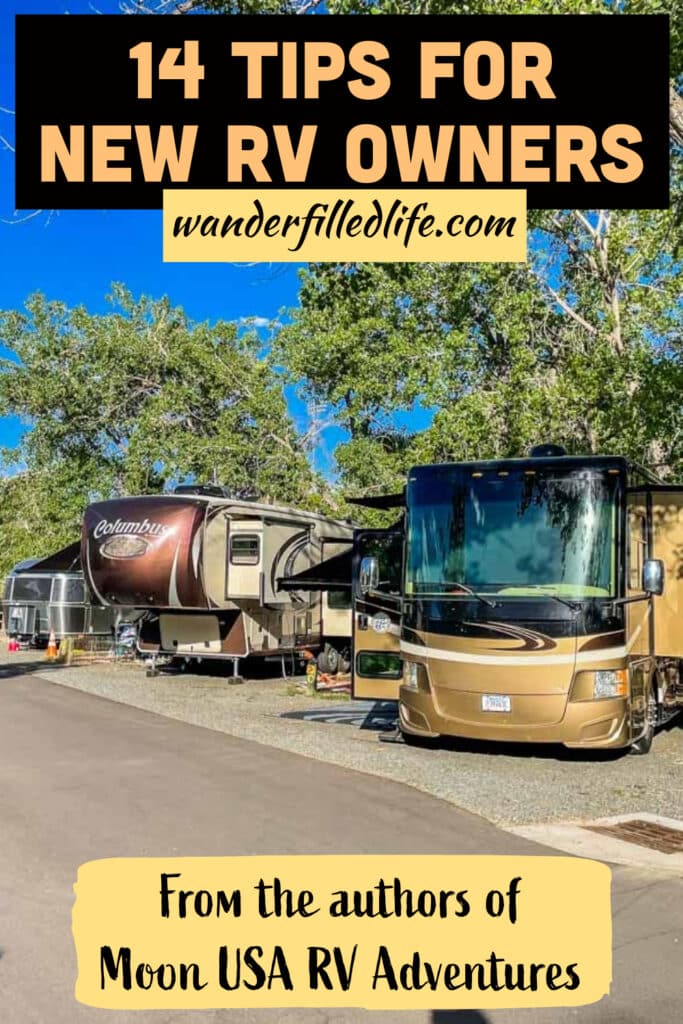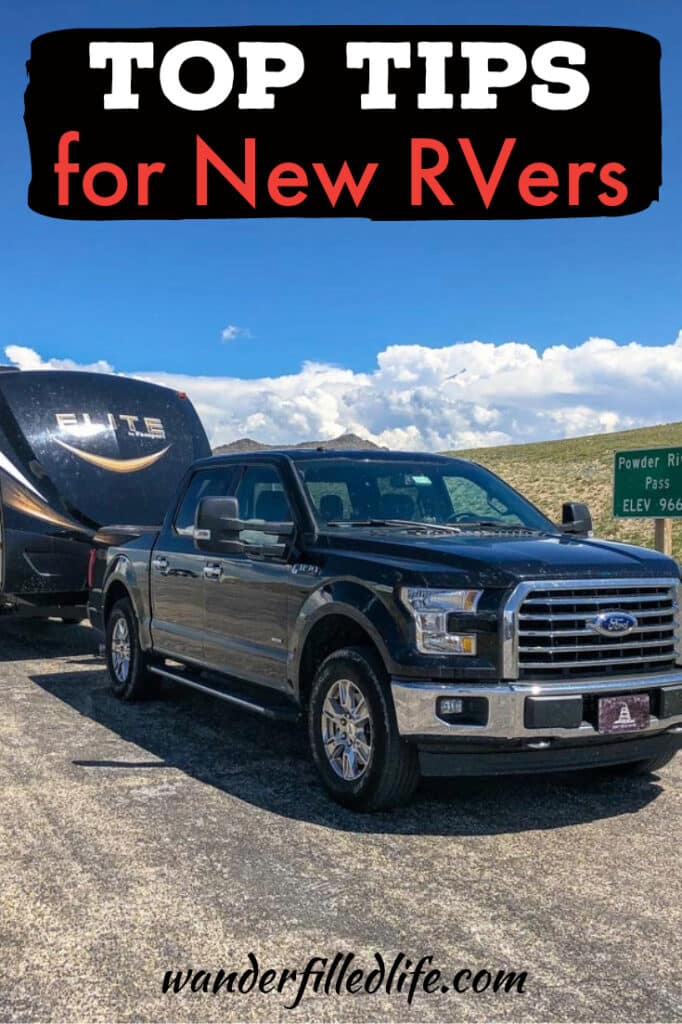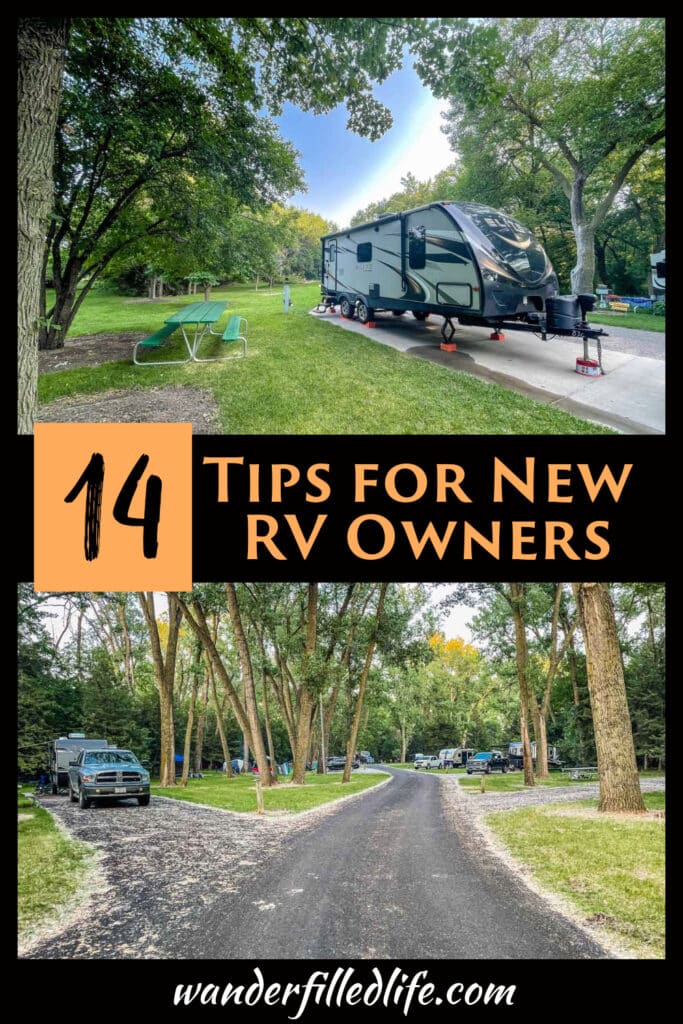Last Updated on February 22, 2024 by Grant
Traveling in an RV is one of the best ways to explore the country. But, there are a few things that new RV owners need to know to ensure safe and successful travels. Whether you just bought your first RV or are still trying to determine if RVing is right for you, we’ve got all the tips you need to get you on the road and prepared for a great adventure.
We purchased our first RV (a 2016 Keystone Passport Elite 23RB) in 2016. Since then, we have spent every summer and many of our other vacations exploring the US in our camper. We’ve taken the RV to almost every state and hundreds of parks.
Truthfully, it hasn’t always been easy. We’ve purchased a lot of equipment, had to find service on the road and had some stressful moments towing and backing up with the camper.
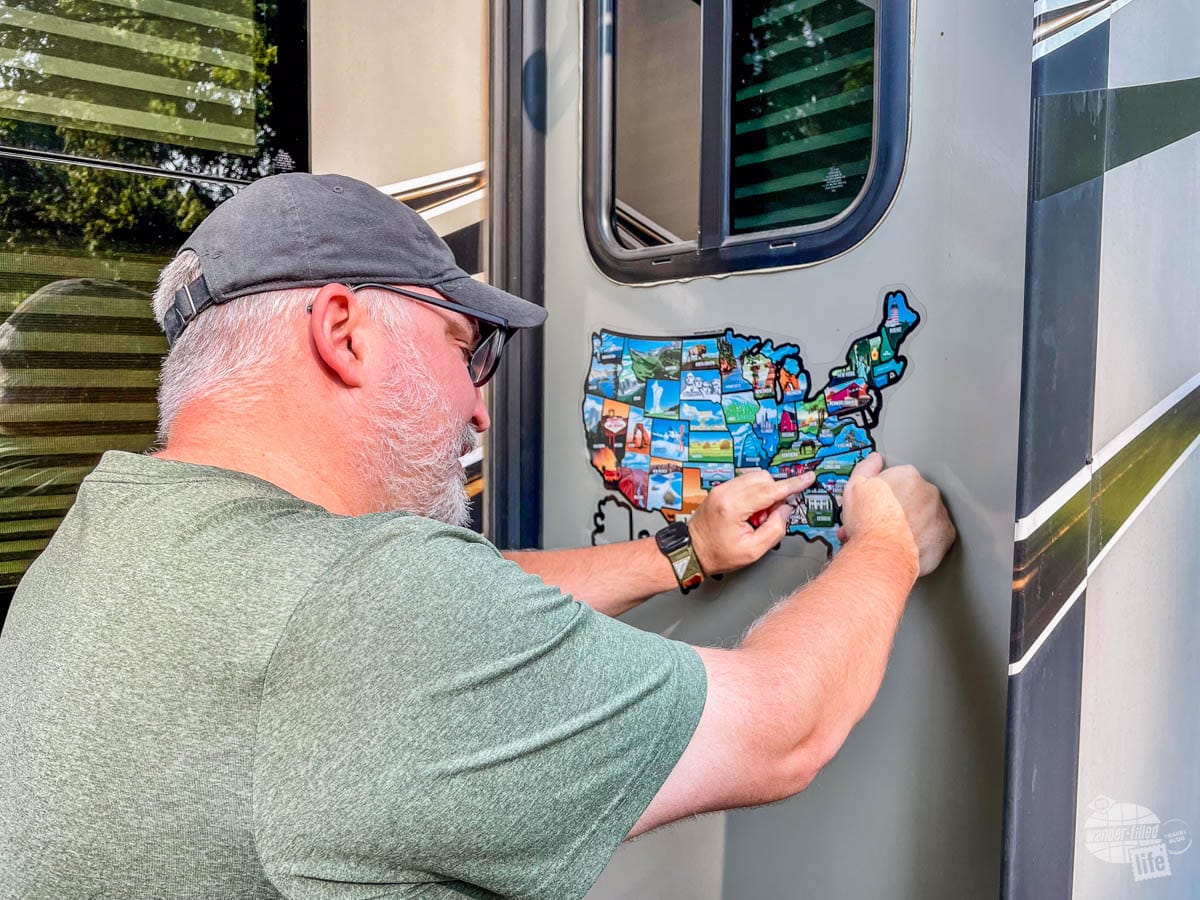
But we’ve also enjoyed some fantastic campgrounds, seen breathtaking views, met some amazing people and made many great memories. We even got to bring our cat with us for a few years before she passed away.
Yes, owning an RV can be overwhelming, especially in the beginning. That’s why we’re here with these tips for new RV owners. These tips, along with our book, USA RV Adventures, will get you on the road and exploring the world around you with confidence.
For those of you searching for an RV, check out our article on preparing for your first RV show.
(Disclaimer: When we link to places where you can buy our stuff or places we stayed, we are using special codes that earn us commissions on the sales at no additional cost to you. Please see our Review Policy for more information.)
1) Know the RV basics.
There are several basic tasks that every RV owner will need to know and be able to do, including:
- how to hook up your connections (water, electric, sewer)
- How to dump your holding tanks
- how to level your RV (especially if you do not have auto-levelers built in)
- how to use the generator (if equipped)
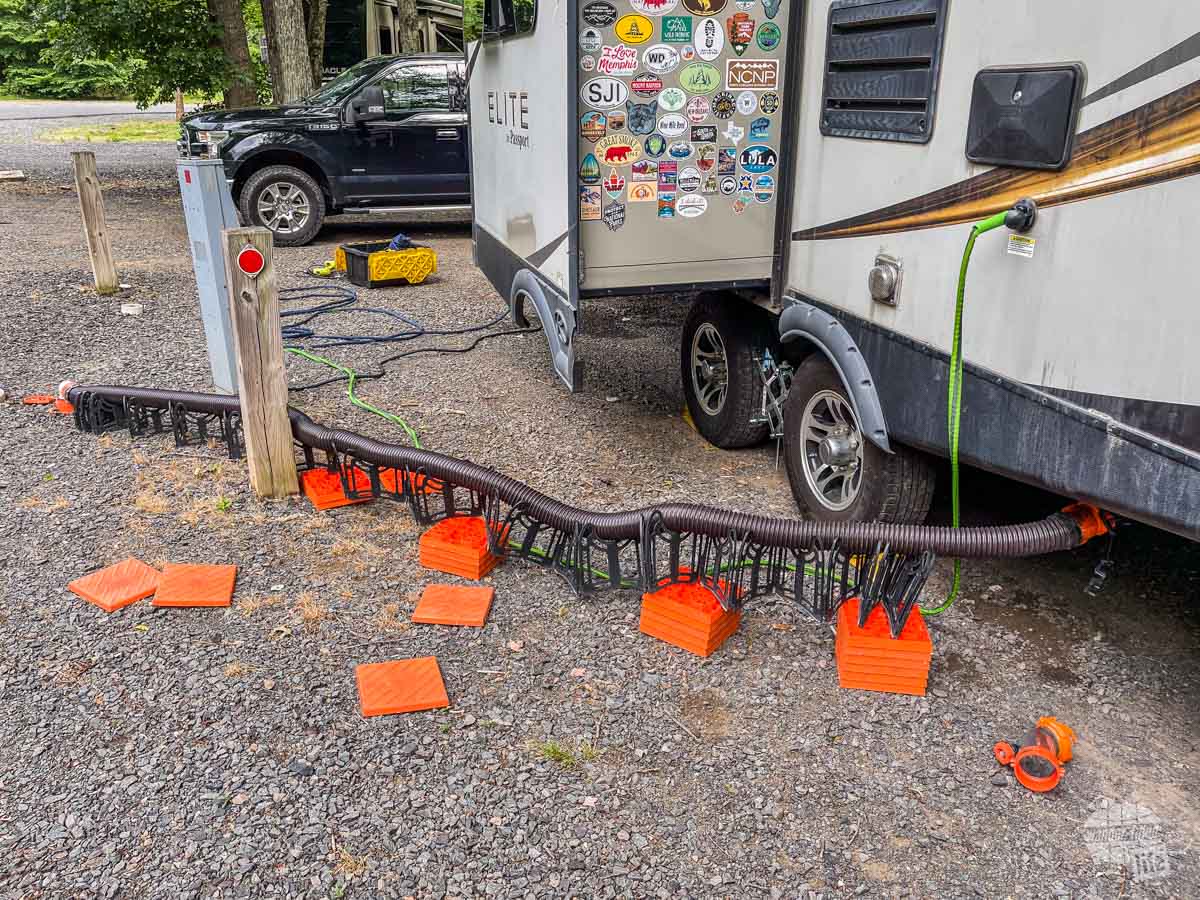
Do not leave the lot without knowing how to handle these things. Not properly setting up your RV and the connections could cause major issues for both you and your RV.
You’ll also need to know how to handle your RV if you plan on camping in the winter or anywhere that you might encounter freezing temperatures.
Check out Grant’s article, Travel Trailer Tips for Beginners, here.
2) You need a lot of stuff.
Perhaps the most important thing to know is that your RV will not come equipped with everything you need to drive off the lot and go camping. The dealer may offer you a “starter kit” of the basics, but you’ll still need to purchase a lot of stuff.
That “stuff” is everything from a hitch to bedding to camp chairs and everything in between.
On one of our first RV trips, I brought bagels for breakfast. Of course, I forgot that we didn’t have a toaster in the RV. Yep, our next stop was Walmart to get a toaster.
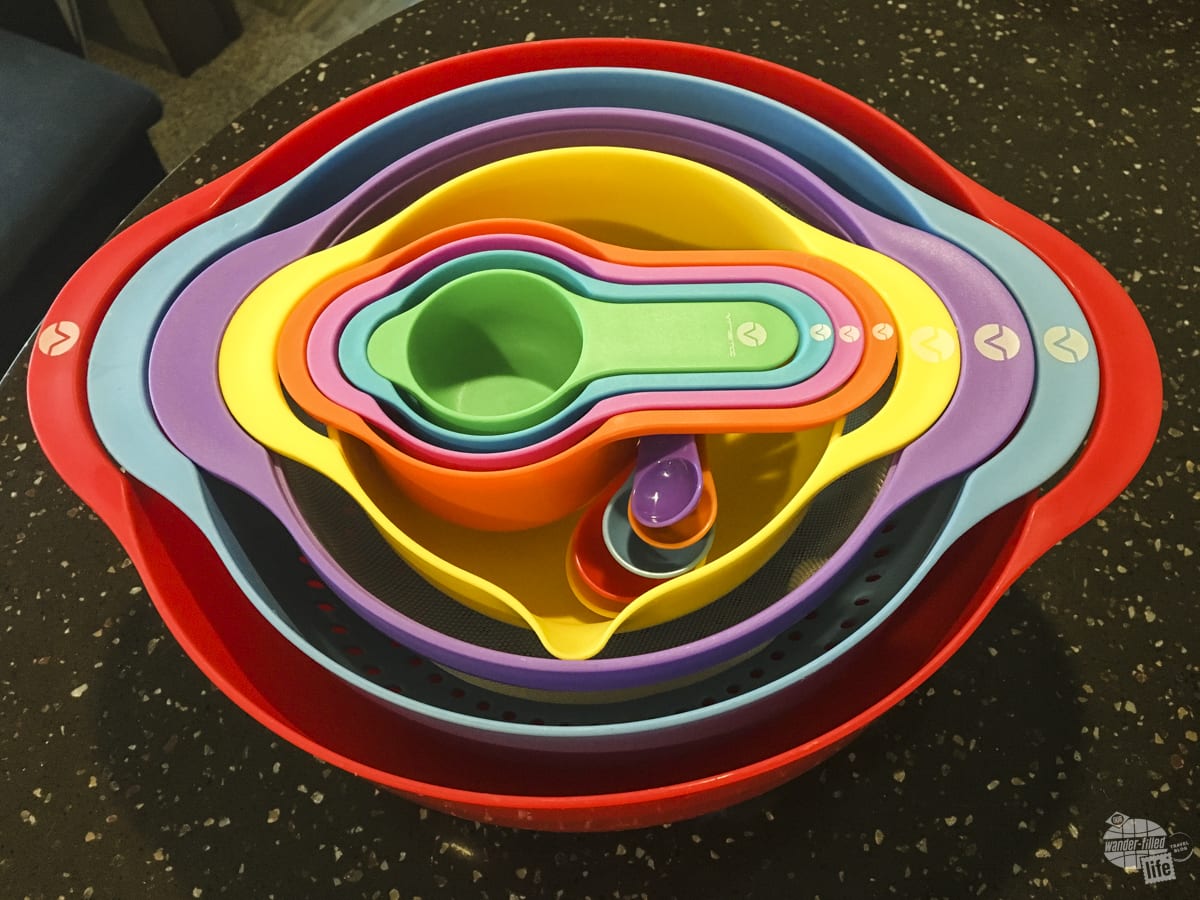
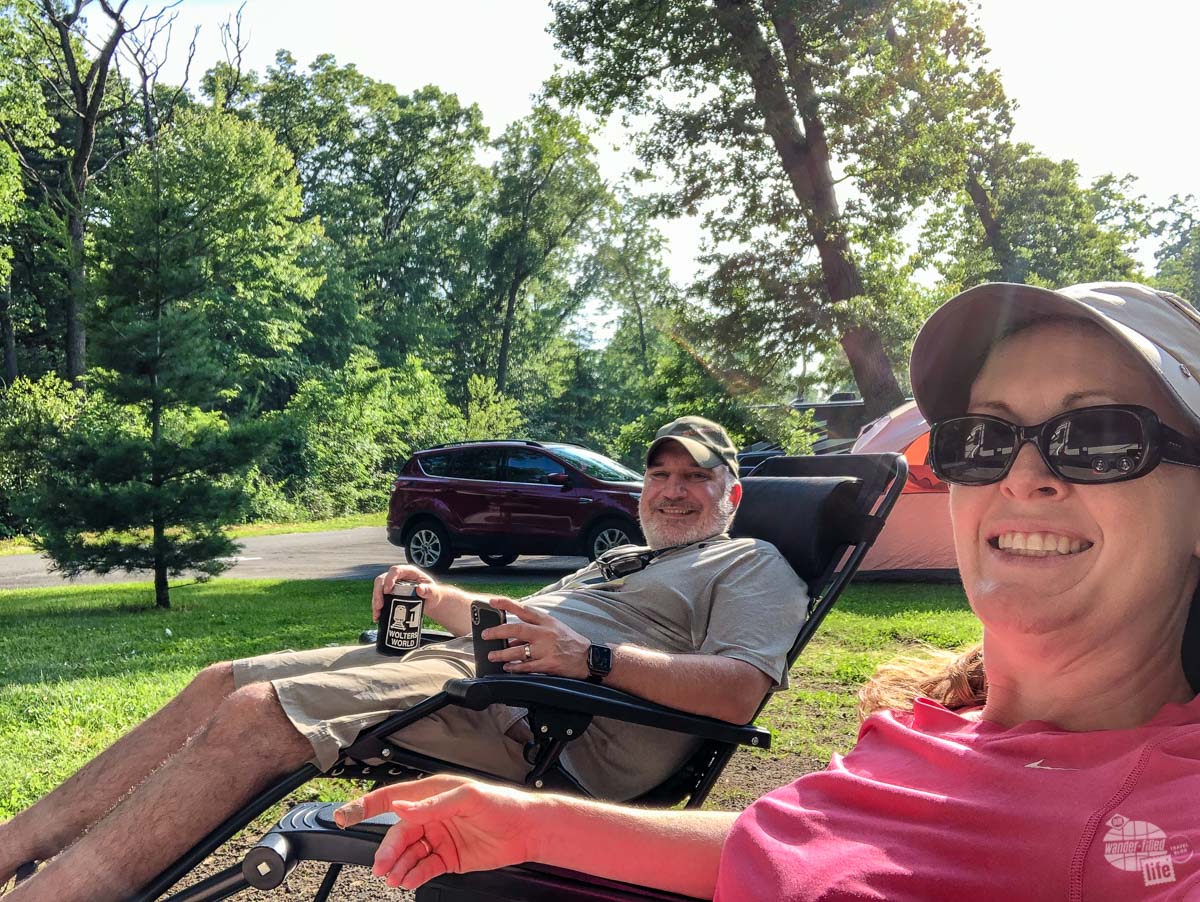
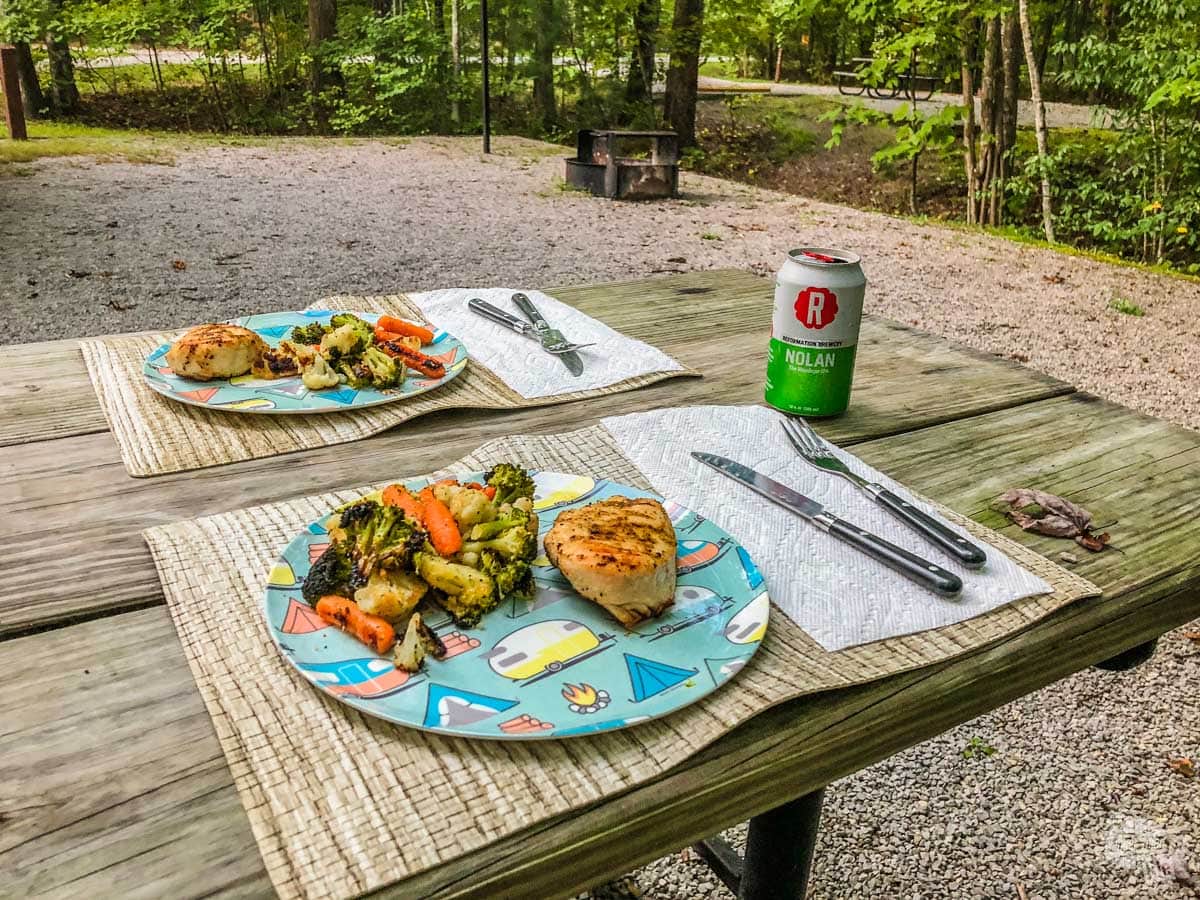
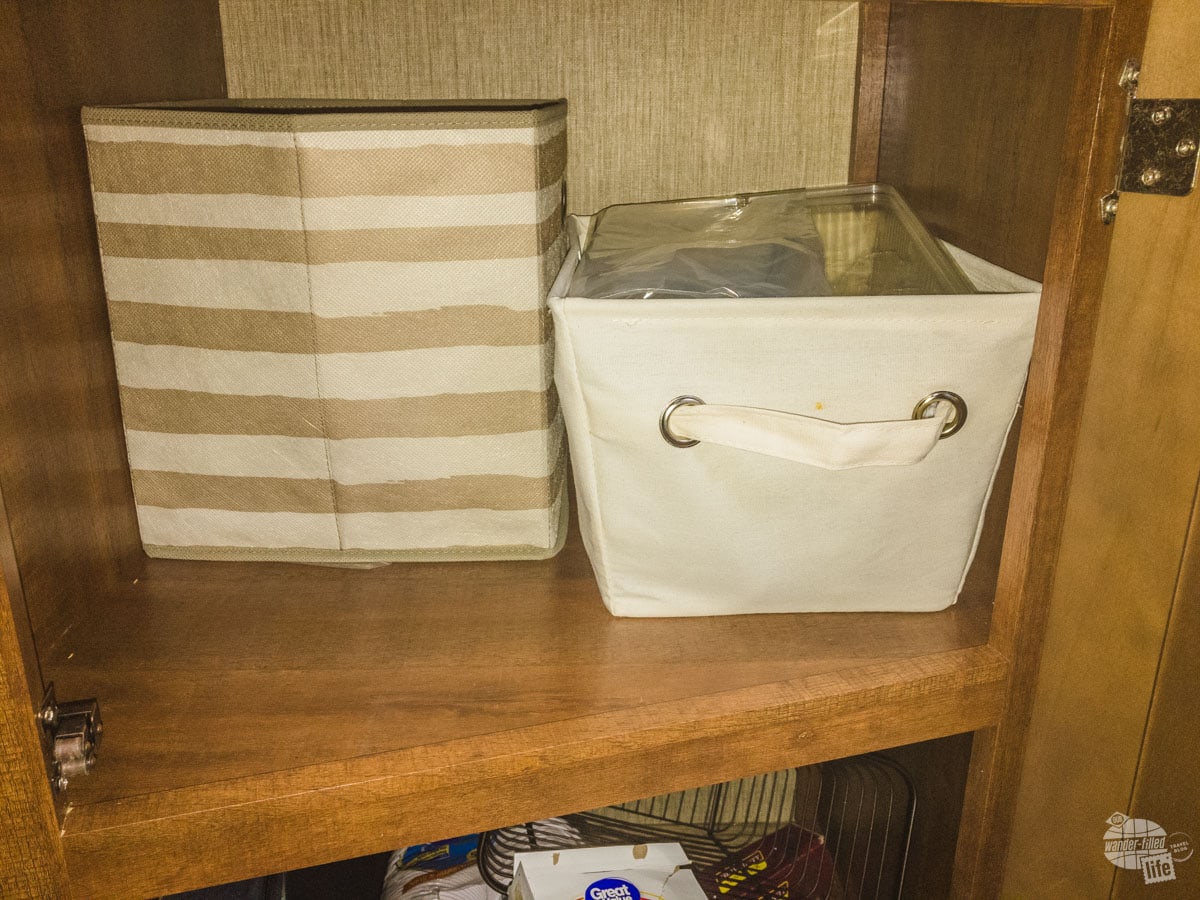
If you’re not sure where to start with this, check out our guide to the RV essentials. This article breaks down all the things you must have to get started RVing.
When you’re ready, check out our full guide to outfitting your new RV. This article is what we were looking for when we were new RV owners. When we didn’t find something useful, we created it ourselves. In the article, we share everything we’ve purchased for our camper – both the must-haves and the wants.
Of course, what you need will somewhat depend on how big your RV is, the specific floor plan, and your personal preferences. But expect to purchase a decent amount of stuff. Not all of it is crucial right off the bat, but you will want to be comfortable, especially if you are planning on spending extended periods of time in the RV.
I guarantee that there will be a few things that you thought you could live without that you eventually decide you can’t.
3) Your RV is a second home.
As you are stocking your new RV and trying to figure out just why you need so much stuff, remember that this is a second home. Even if you aren’t RVing full-time, this is your home away from home.
Yes, you can bring some stuff with you from your house rather than stock a second of everything in the RV, but that sometimes gets old. And, often, you need different types of things in the RV, such as shatter-resistant dishes.
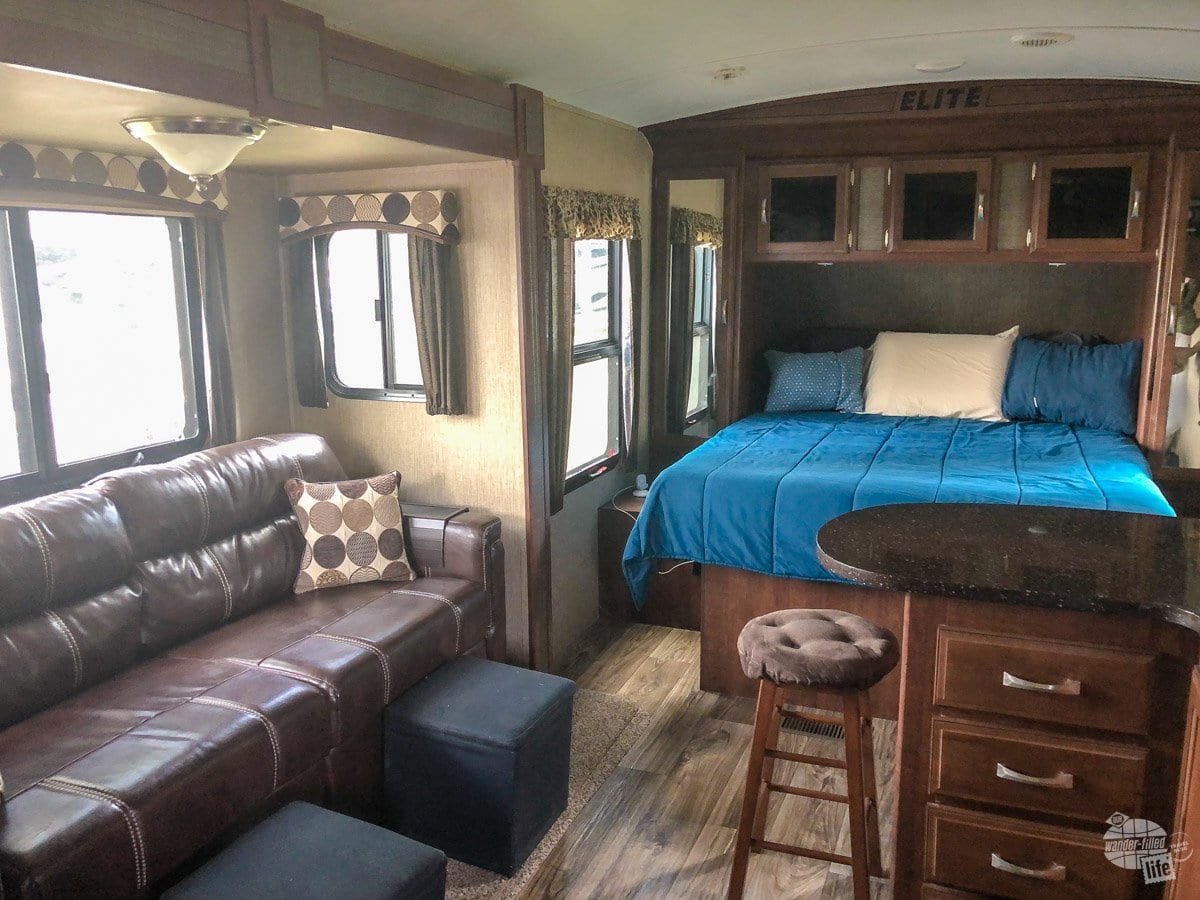
But, the most important reason to think of your RV as a second home is for tax purposes. Yep, even if you’re only spending a few nights a year in your camper, you can still write it off as a second home.
Admittedly, with the current standard deduction, this may be less important than it was several years ago. Still, if you itemize your deductions, you can save a bit by claiming your RV as a second home.
4) Know where you are going.
Both new RV owners and seasoned veterans sometimes struggle with where to go and how to get there in the RV. That’s why we wrote our guidebook, USA RV Adventures.
The book includes 25 routes that take you all over the country. Routes range from five days to more than a month long. Each route includes turn-by-turn directions, along with things to do, restaurant and grocery store recommendations and, of course, campgrounds.
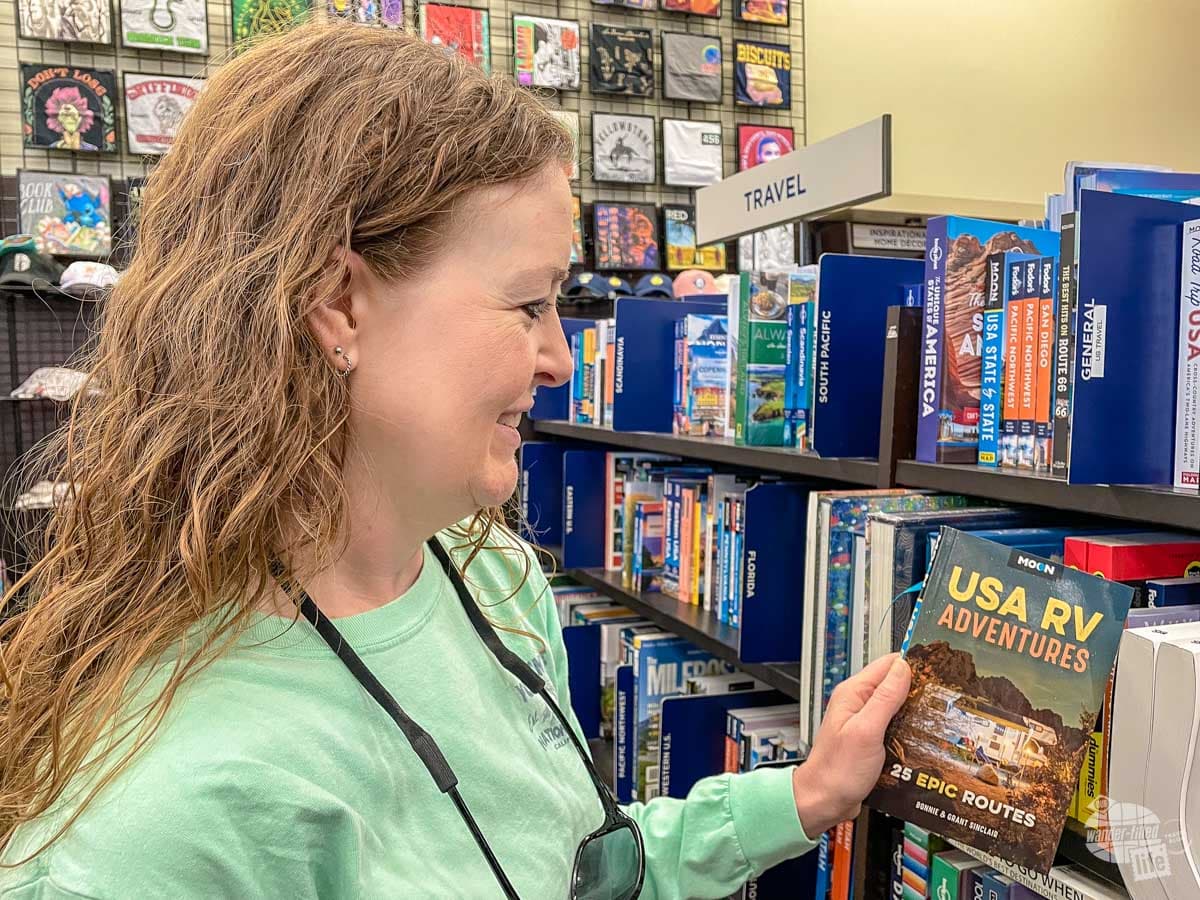
At the end, you’ll find a section on RV basics, which includes essential information and tips for new RV owners (or renters).
If you’re struggling to determine where to go, what to do once you get there or other points of interest along the way, USA RV Adventures is the answer.
Our companion article, RVing the USA, provides a brief introduction to each of the 25 routes, along with a few updates and corrections. It’s a great starting place that will (hopefully) convince you the book is worth the money ;-).
5) Don’t always trust your GPS.
Once you’ve stocked your rig and outlined your itinerary, it’s time to hit the road. Just be careful when following your vehicle’s or phone’s GPS.
Always be on the lookout for low overpasses (make sure you know your RV dimensions, especially the height). If driving in city traffic, you might encounter tight turns. Some roads (including all parkways in New York) are off-limits to RVs. And you may not want to drive your RV on an unpaved road.
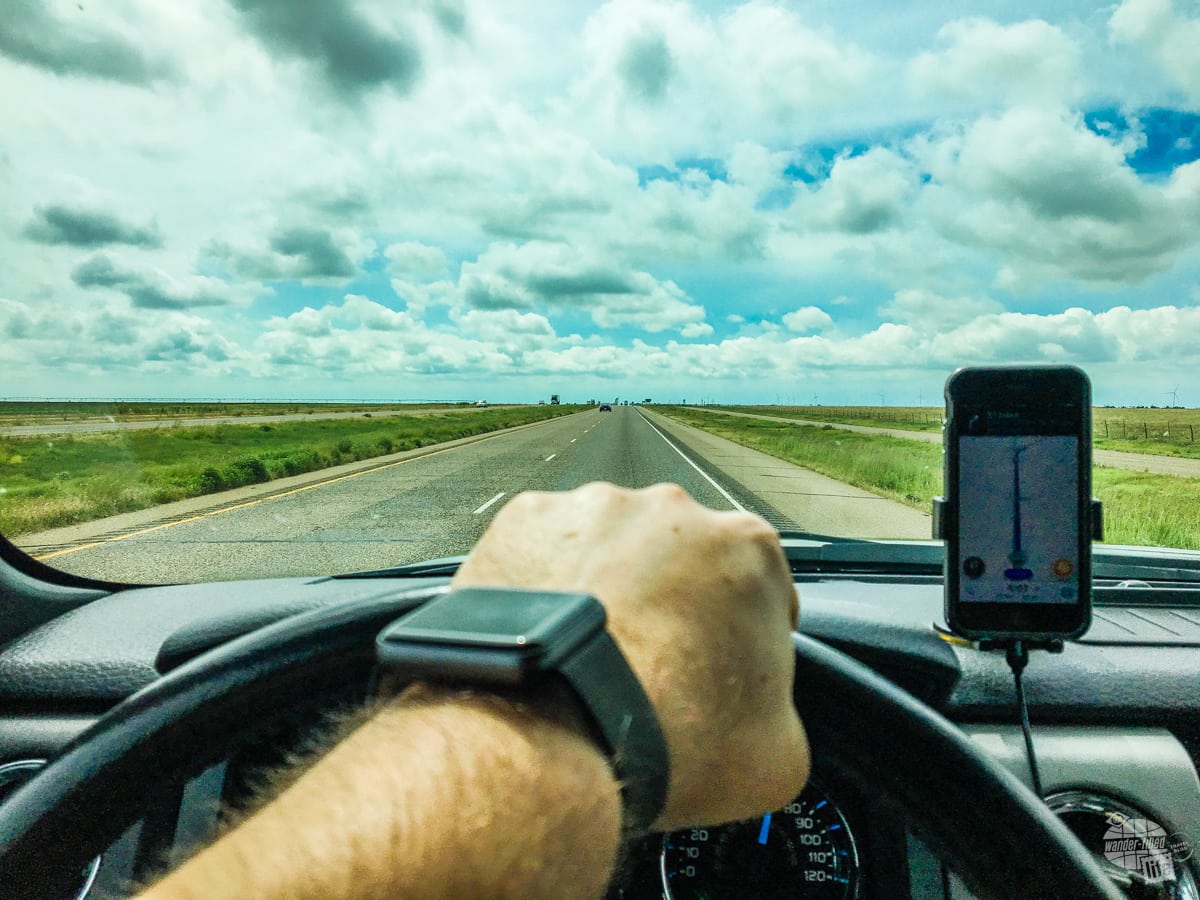
If you’re traveling on the interstate, chances are you will not be going the speed limit with your RV. Everyone is a bit different in terms of how fast they are comfortable driving, but in general, you likely won’t be traveling 70+ mph consistently. Thus, it will take longer than the GPS says it will take. Just be sure to consider this when determining how far you want to drive in one day.
If interested, you can purchase an RV-specific navigation system. So far, we have stuck with just using our truck’s navigation or Apple Maps. So, we don’t have any specific recommendations.
Still, if you are driving (or towing) a large RV, plan to do a lot of city driving or just want to have that extra layer of caution, an RV navigation system is not a bad idea.
6) You can’t stop just anywhere.
Once you’ve set your route, at some point you’re probably going to need to stop. Whether it is for food, a bathroom or gas, unless you’re only driving an hour or two, you should always expect to have to stop. And when you’re bigger than the average vehicle, that isn’t always easy. That’s why camper vans are so popular!
Whether you are towing your RV or driving a motorhome, you can’t just pull through a fast-food drive-thru. Even parking at a restaurant can be difficult or impossible. Gas stations are typically a bit better, but not always.
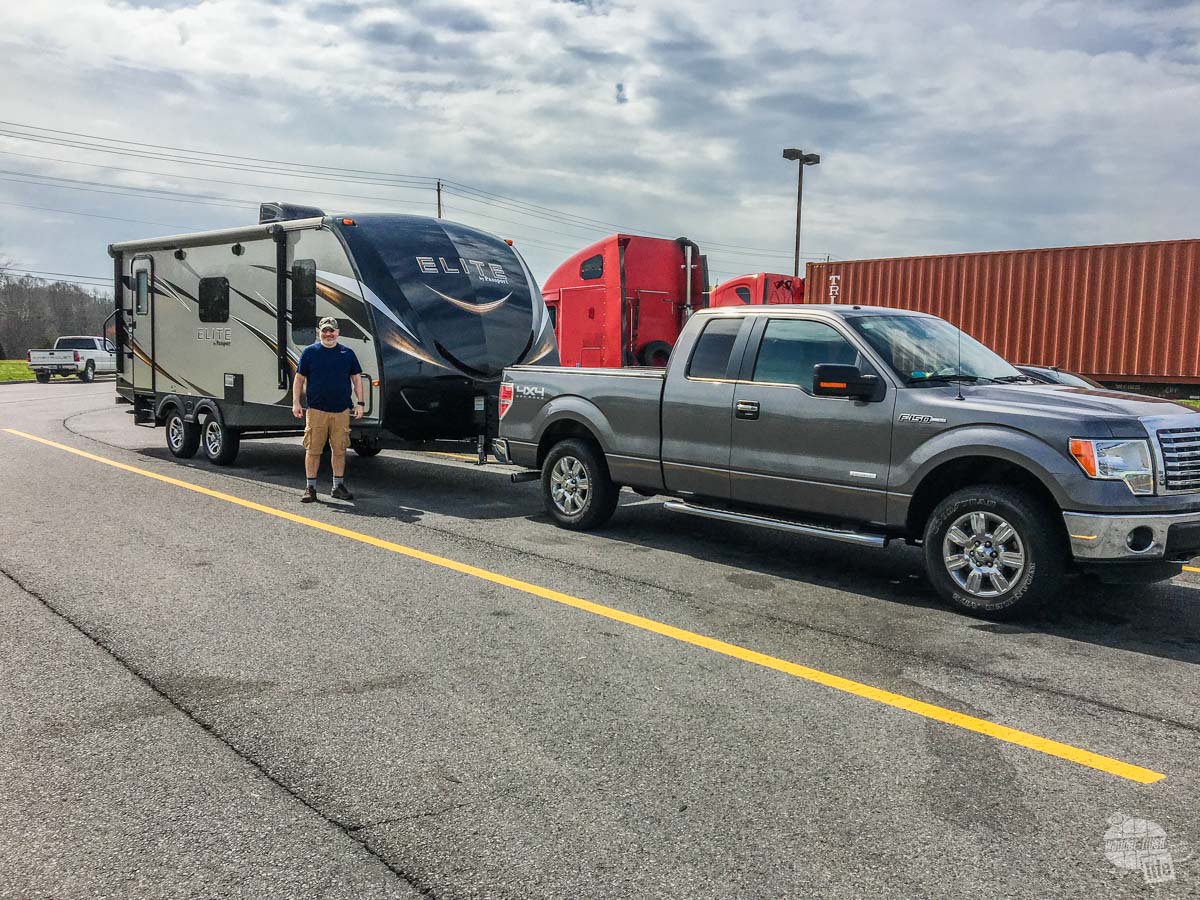
We have come to love truck stops such as Pilot/Flying J and Love’s for both gas and food. These usually are large enough that RVs don’t have any issues unless it is very busy. We have found a few smaller ones, though, that we’ve had to bypass due to the setup.
At these truck stops, you’ll generally fuel up in the “normal” car fueling area, even if you need diesel. A few of them do have RV-specific lanes, though.
If you can’t find a truck stop, I suggest using the satellite view on Google Maps or Apple Maps to view any unfamiliar gas stations or parking lots. Just look to see that you have plenty of room to park and maneuver through the area in general.
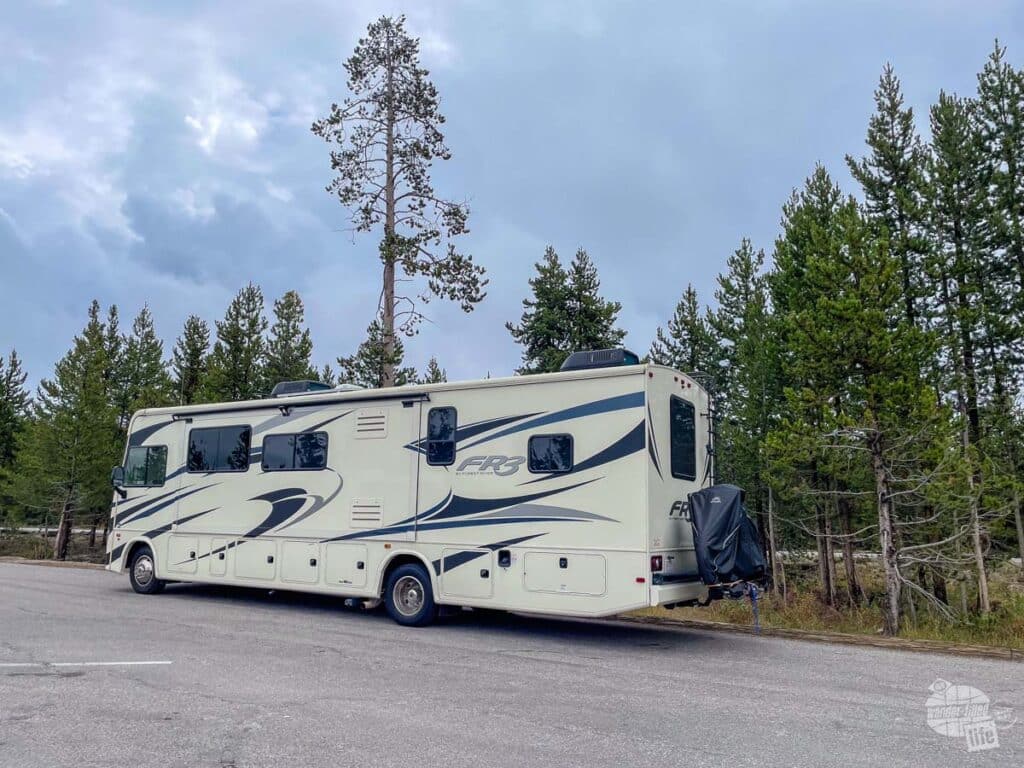
Of course, sometimes you just have to wait and see how it looks and how busy it is. You may even have to keep on going, even if you thought you should be able to fit.
Parking at a grocery store, Walmart, strip mall or other large parking lot is typically a lot easier. And you’ll often find restaurants or fast food joints within walking distance.
7) You may want a get-around vehicle.
One of the biggest considerations for new RV owners is how you will get around at each of your destinations.
Driving a large RV everywhere you go is cumbersome. You will have difficulty parking and may even have to skip stops simply because there isn’t anywhere to park.
If you’ve got a camper van or small motorhome, you might be able to maneuver through city streets and parking lots just fine, but consider the hookups at your campground. You will not want to have to disconnect your water, power and sewer every time you need to leave your campsite.
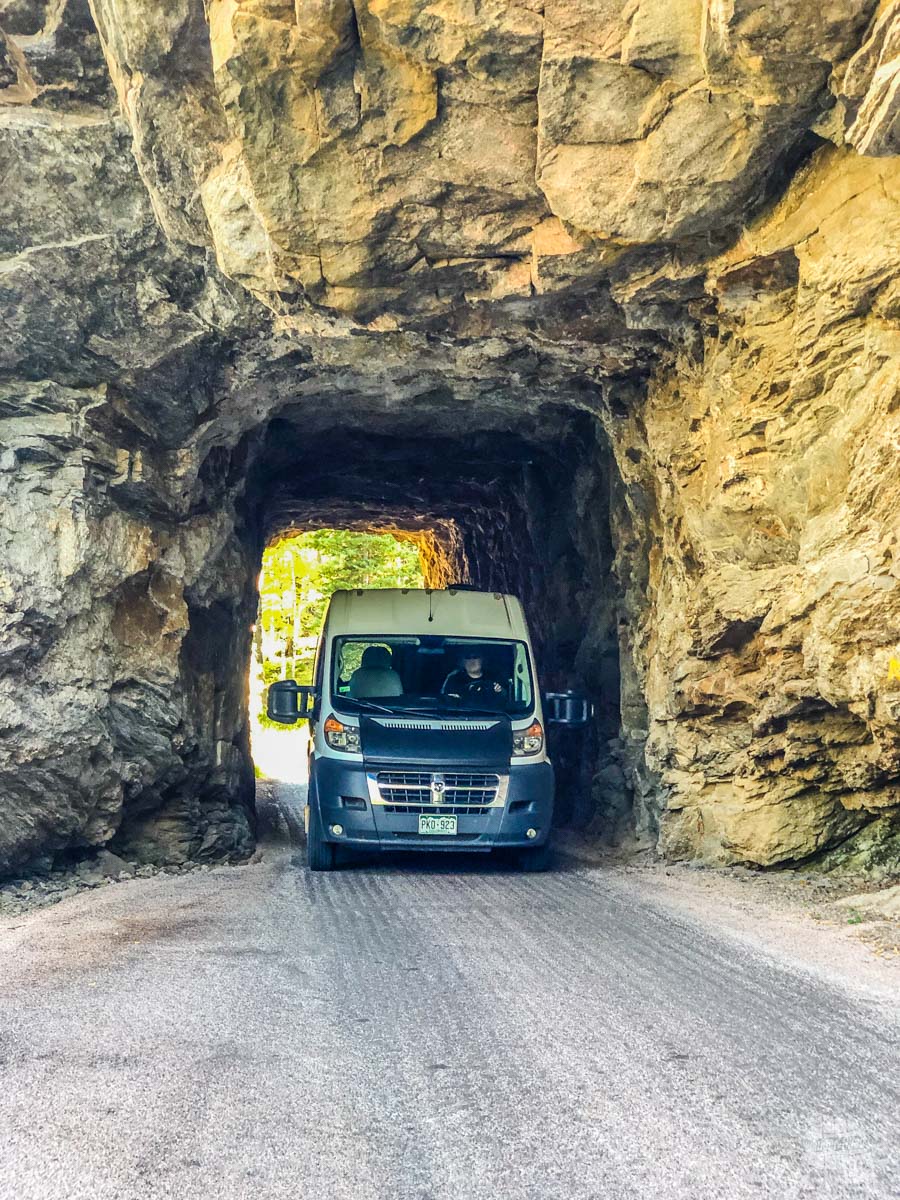
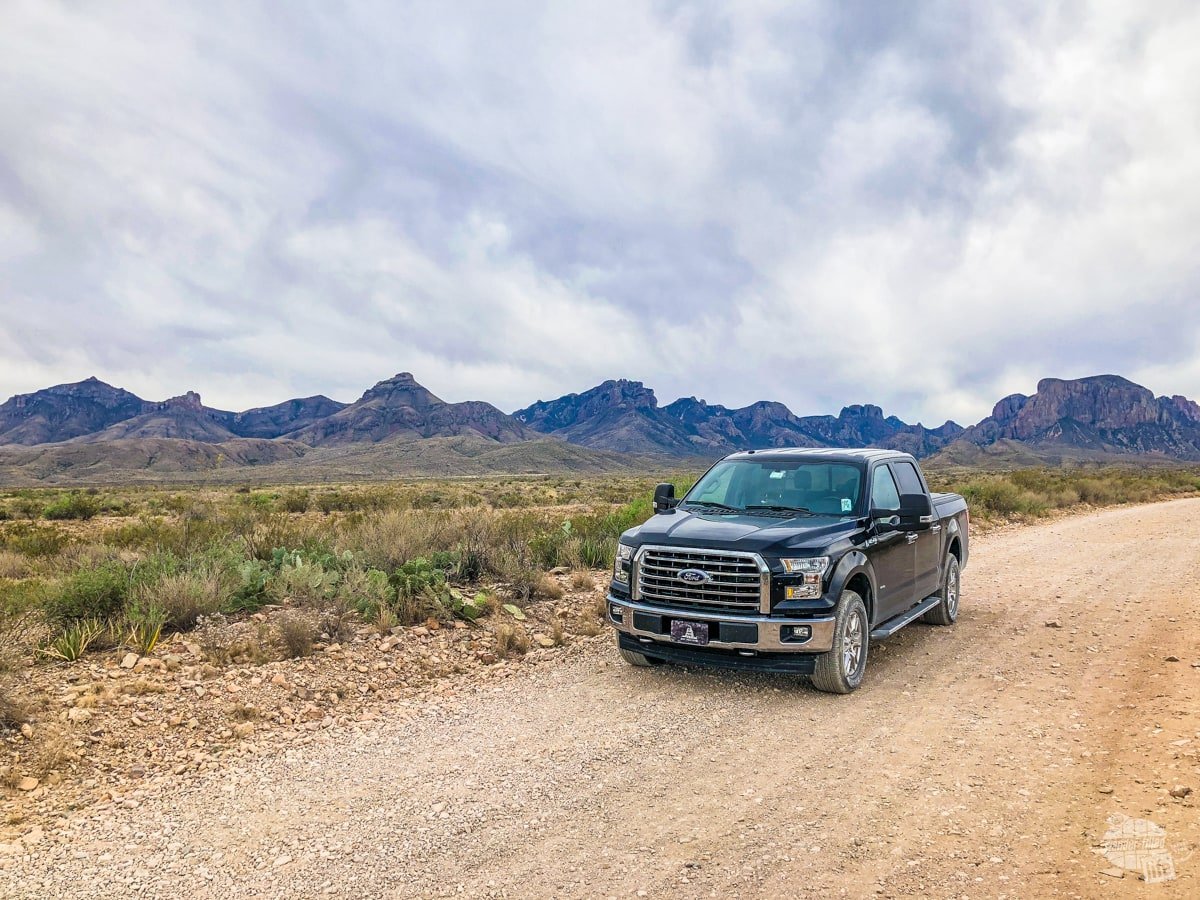
For those towing a trailer or fifth wheel, you’ve got your get-around vehicle already. For those driving a motorhome, consider whether you want to drive it everywhere or tow a small vehicle for your daily exploring.
If you want a towed vehicle, you’ll need to consider what your RV can tow and how to tow that vehicle. Few vehicles can be towed on all four tires. That is why you sometimes see towed cars on a dolly or trailer.
Hopefully, these were things you considered before buying your RV. If not, you’ll have to figure out what works for you and your vehicles.
Check out our review of our 2017 F-150 here.
8) Expect Things to Go Wrong
Any trip you take is likely to have something go wrong. Whether it is booking a hotel that is not as convenient as expected, forgetting to make tour reservations or getting a flat tire, the truth is that things can and will go wrong.
That, of course, is also true with RV travel. This is one reason why we purchased a trailer rather than a motorhome – one less engine to have to worry about. But, things still happen.
New RV owners will have to learn how to navigate the complexities of issues both on and off the road.
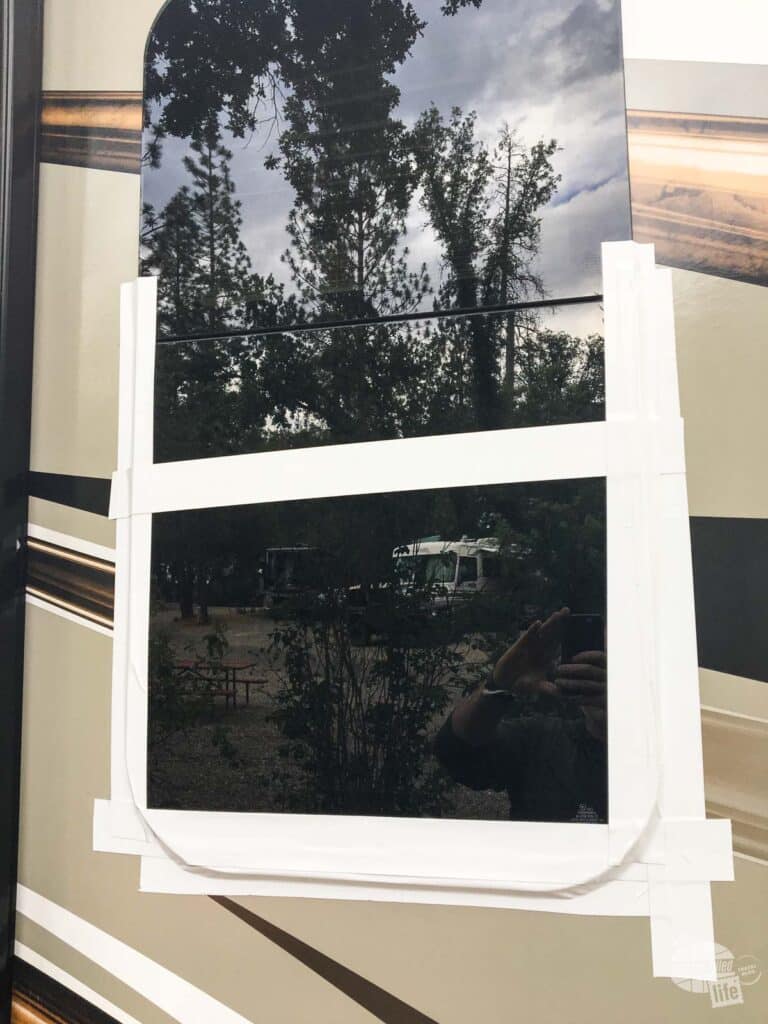
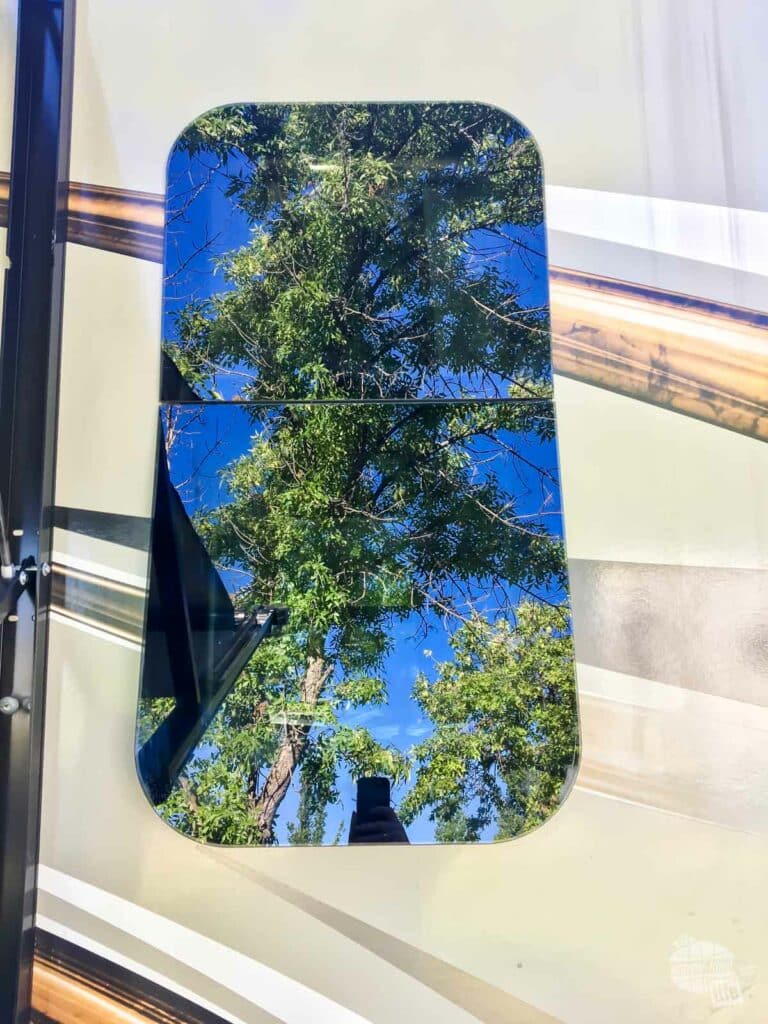
One summer, we overtightened a window crank and broke it to the point that the window had to be taped closed. That same trip, the pull bar on the black water tank fell off, so we couldn’t empty the tank until we got a new one.
We’ve also had major axle damage twice. The first time, we had to cut our Great Lakes road trip short and return home. Thankfully, we only had a couple of stops remaining in that trip. But, it was still a big disappointment for us.
The second time, we were lucky to find a repair shop in Salt Lake City that was able to get it fixed within a couple of days. But, it did mean two nights in a hotel and having to adjust our itinerary.
Things happen. Sometimes they are small and can wait for repairs. Sometimes they are big. Should you get into an accident, getting an RV towed is a lot more difficult than getting a car towed.
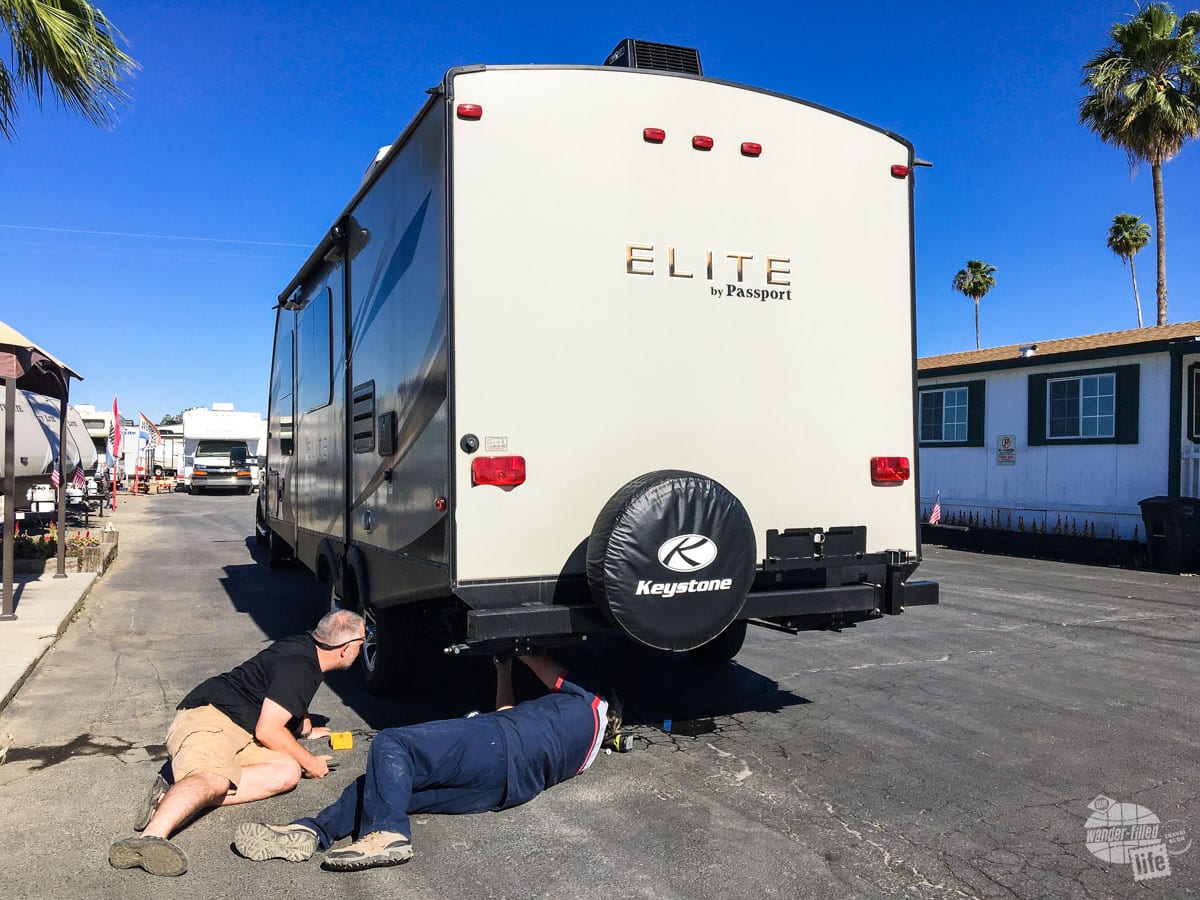
That is not meant to discourage you from getting an RV. They are wonderful and the vast majority of the time we have absolutely no issues or problems. Just remember that there will be times you have to deal with things and it might not always be easy or quick.
9) RVing may or may not save you money when traveling.
If you’re hoping to save some money by RVing, hopefully, you did some math before taking the plunge. Finances, of course, will depend on how you currently travel, how much you travel and what RV you buy.
Before buying a camper, we did a lot of tent camping to save on hotel costs. If getting a hotel, we generally spend about $100/night while also saving points to redeem periodically. Of course, tent camping and redeeming points for free hotel stays brought our average cost per night down quite a bit when traveling.
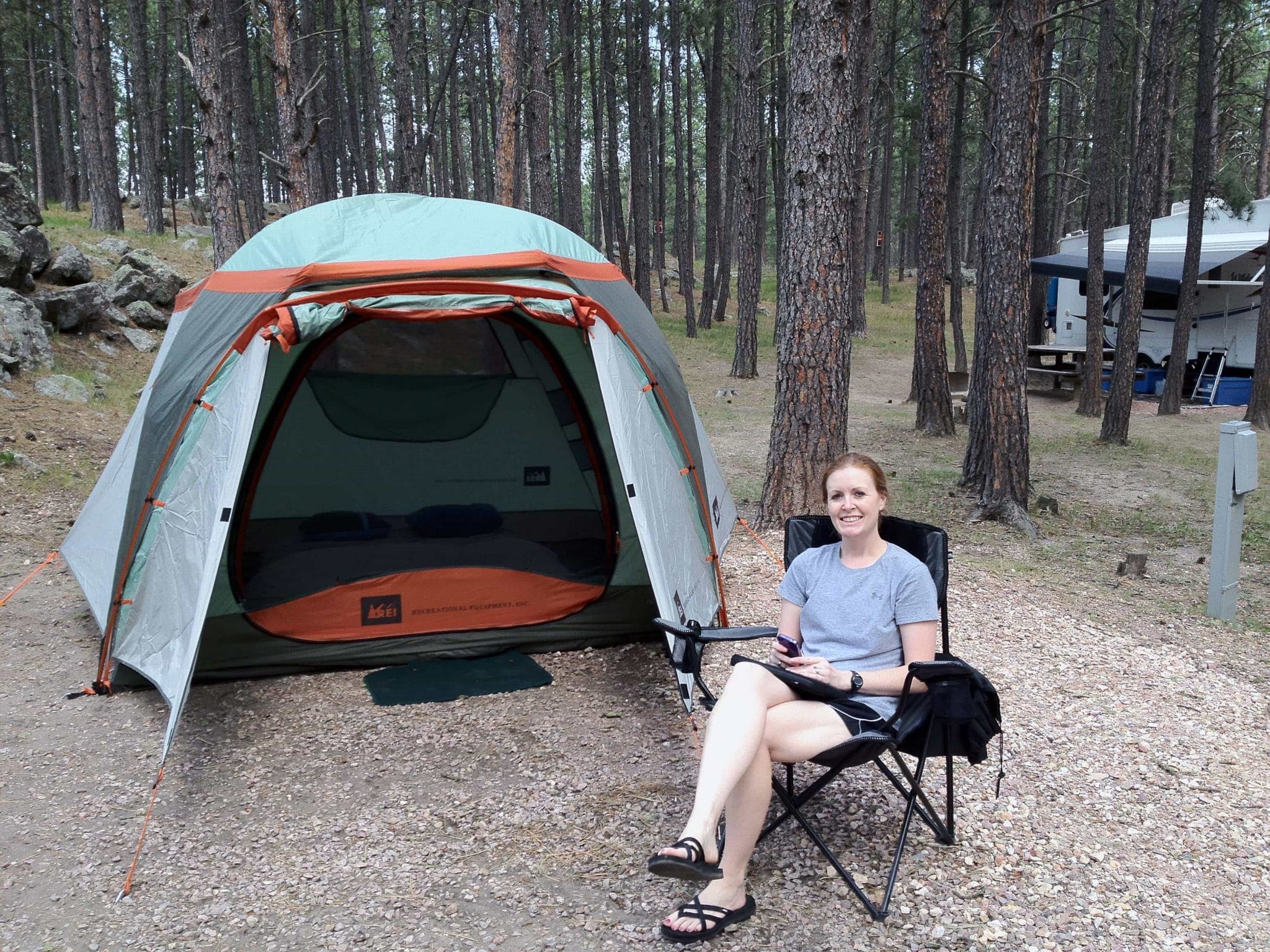
Based on that, we do not necessarily save money by RVing versus hotels and tent camping. The RV itself was a large purchase. We also have to pay for storage since we live in an apartment. And, of course, you need insurance on your RV.
Additionally, we spend a lot more money on gas when pulling the camper. And, getting a campsite with full hookups often costs more than a tent site. These expenses add up.
But, remember, having an RV is not just about the money. It is the experience, too. Being able to have your own bed, cook your own meals and have some privacy in your “home” makes a big difference, even if it’s not saving you money.
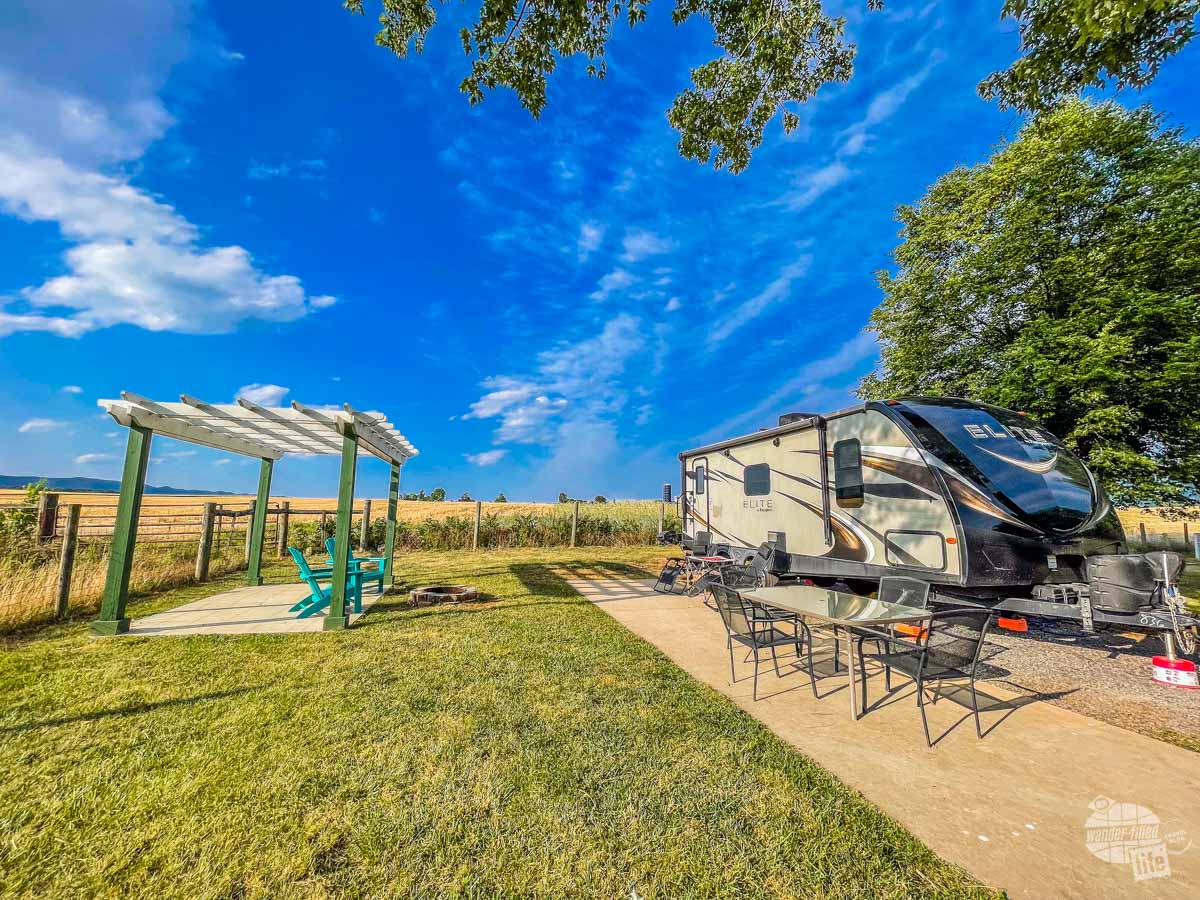
And, having air conditioning and a real bed, along with a bathroom and kitchen is much better than a tent.
For a breakdown of the costs of tent camping vs. RV camping vs. staying in a hotel, check out Grant’s post.
10) Know where you can and can’t camp.
Some people dream of hitting the open road in their RV and just figuring everything out as they go. But, it’s important to know that you can’t camp (or park) just anywhere overnight.
Many rest areas and parking lots do not allow overnight parking. And in certain locations, getting a last-minute spot at a campground can be difficult or impossible. We have had some luck getting campground reservations at the last minute. But, we only recommend that if you have a flexible schedule and a backup plan.
For those who want a more flexible schedule, a rustic camping experience or just a free night of camping, consider boondocking. This is the practice of camping on unimproved Federal land or in a field through a service such as Harvest Hosts. In this case, you’ll find no hookups or services of any kind.
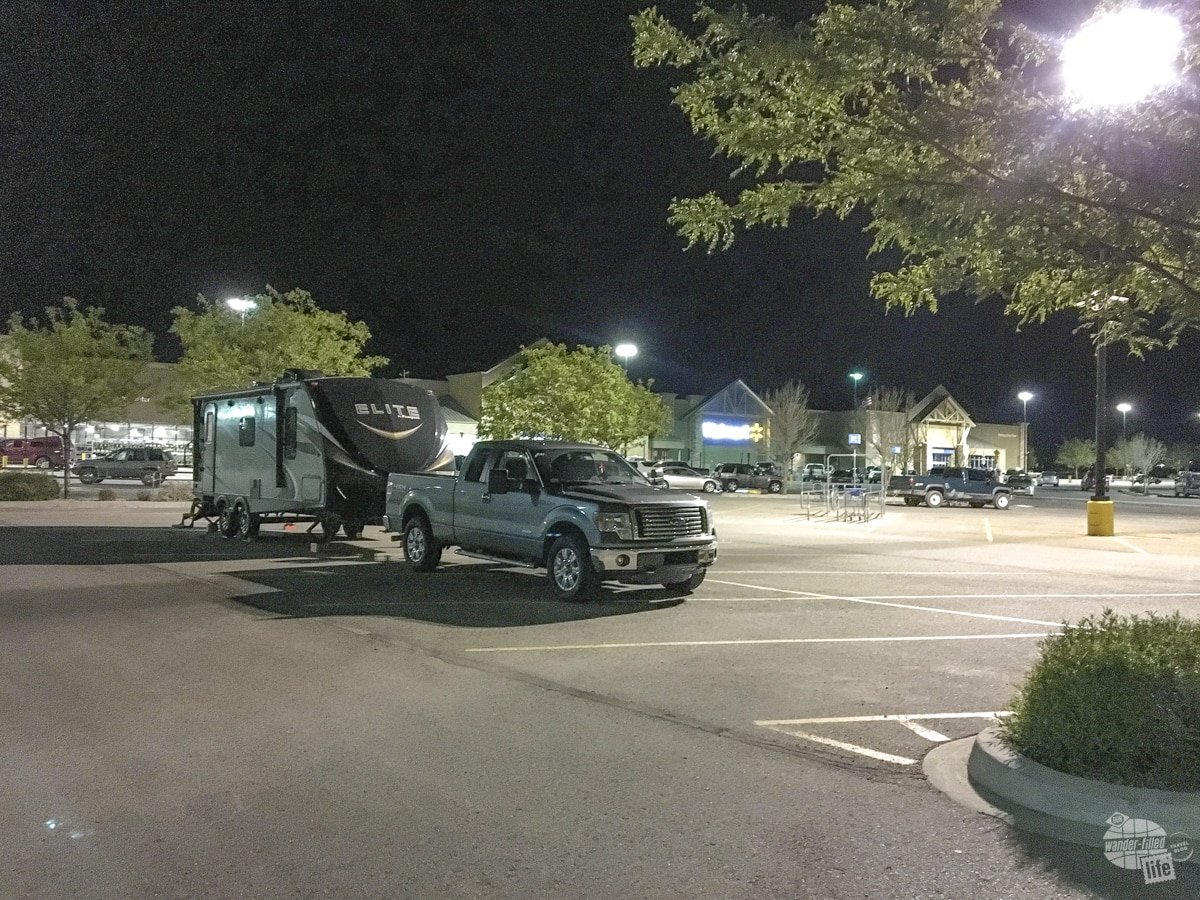
If you just need a quick overnight stop on your way somewhere, there are a few businesses that allow overnight parking for RVs. Two popular places for this are Walmart and Cracker Barrel. But, this varies by location and local ordinance, so always ask before you settle in for the night (or, if possible, before you arrive).
We have spent a few nights in a Walmart parking lot with both positive and negative experiences. But, boondocking is not something that we do a lot of at this point.
That said, we have had a couple of great experiences dry camping (camping in an established campground but without any hookups). Specifically, we enjoyed the Cougar Rock Campground at Mount Rainier National Park and at Broken Arrow Campground, a US Forest Service campground just north of Crater Lake National Park.
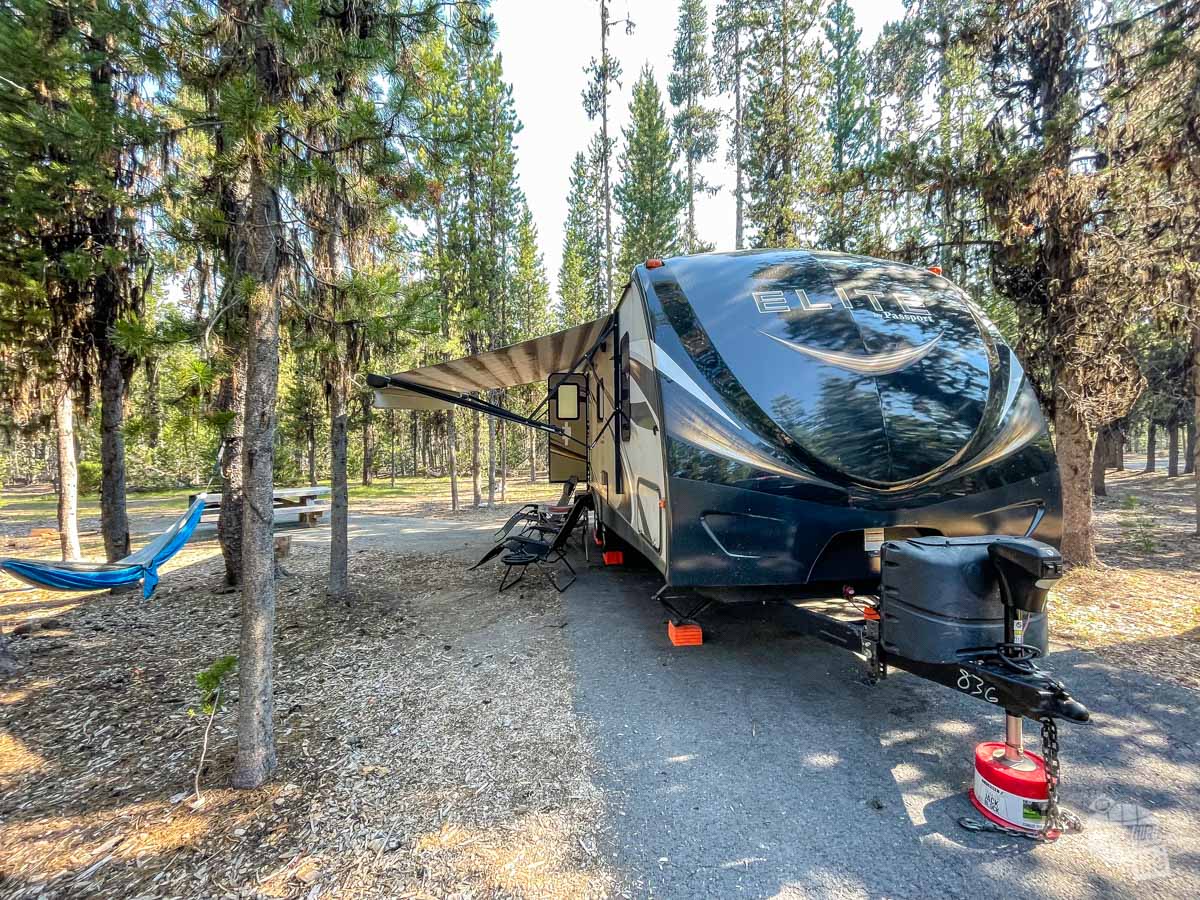
But, when the weather cooperates and the timing is right, we always love a free night of camping!
There are a number of apps and websites that will help you find campgrounds. Our go-to site is RV Life Campgrounds but they tend to include only established public and private campgrounds. Allstays and Campendium are a couple of others that we use when specifically looking for places to boondock.
11) For couples: divide and conquer but know a little about everything.
Managing an RV takes a lot of work.
If you have a trailer, fifth wheel or tow vehicle, you have to know how to get it hooked up. Once you arrive at your campground, you need to be able to secure the RV and hook up your connections. When preparing to move the camper, you need to know how to store everything for safe transport. All these things take practice.
Learning everything you need to know can be overwhelming for new RV owners. Anything you can do to lessen the load will help.
Each person in the family or travel group should have his/her tasks that they are always responsible for. This allows you to become an expert and complete that task correctly and efficiently each time.
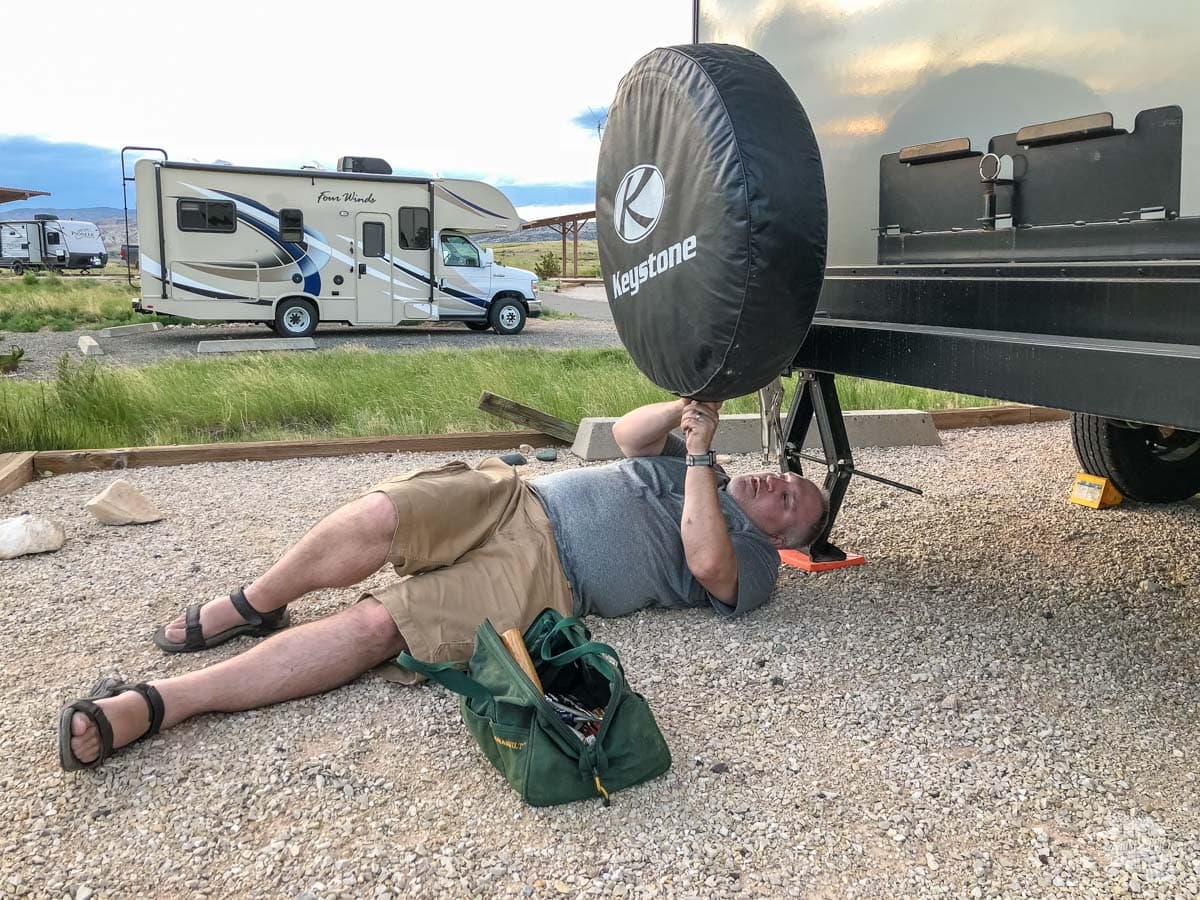
For example, Grant is in charge of most everything outside the camper: securing the hitch and setting up the connections, in particular. I am in charge of the inside: moving items into place for use when we arrive and securing them in storage before traveling. This allows us to each know what we are responsible for and get it done quickly and smoothly.
At the same time, I think it is important for each of us to know what the other is doing and how to do it in a pinch. A classic example is if it’s getting late or bad weather is coming in and you need to complete the outdoor tasks quickly. If I can get out there and help it will go faster and I won’t just be standing there waiting for Grant to tell me what to do.
And should one of us ever get injured to the point of not being able to help, the other can set everything up even if it takes a bit longer.
12) Share the driving responsibilities.
One of my biggest frustrations is women who will not help out with the RV driving. I grew up around trucks, trailers and large tractors, so I suppose that the idea of driving a truck and pulling a camper is less stressful for me than most women. But it really is not difficult… at least not until you have to back up!
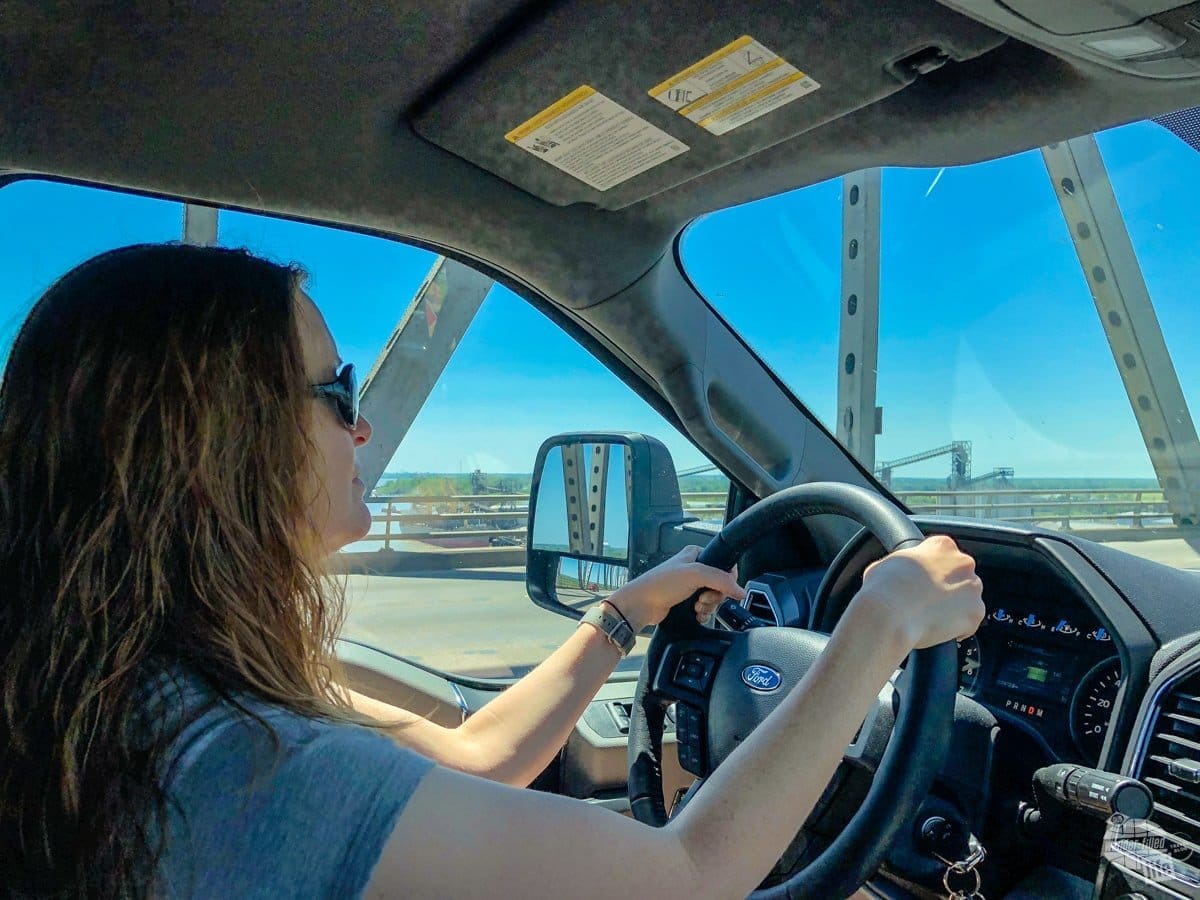
Seriously, if you can drive a car or SUV, then you can drive an RV. Granted, I have never driven a large Class A motorhome but all the other trucks and vans I’ve driven have been the same as my first car, just bigger.
I will say this, though: driving an RV can be more tiring than driving a car or truck. Having a second driver will make all the difference in the world. Even if you’re just providing a one-hour break, having that mental rest is more important than you realize. If you can truly split the driving 50/50, then you’ll get twice as far and/or be half as tired.
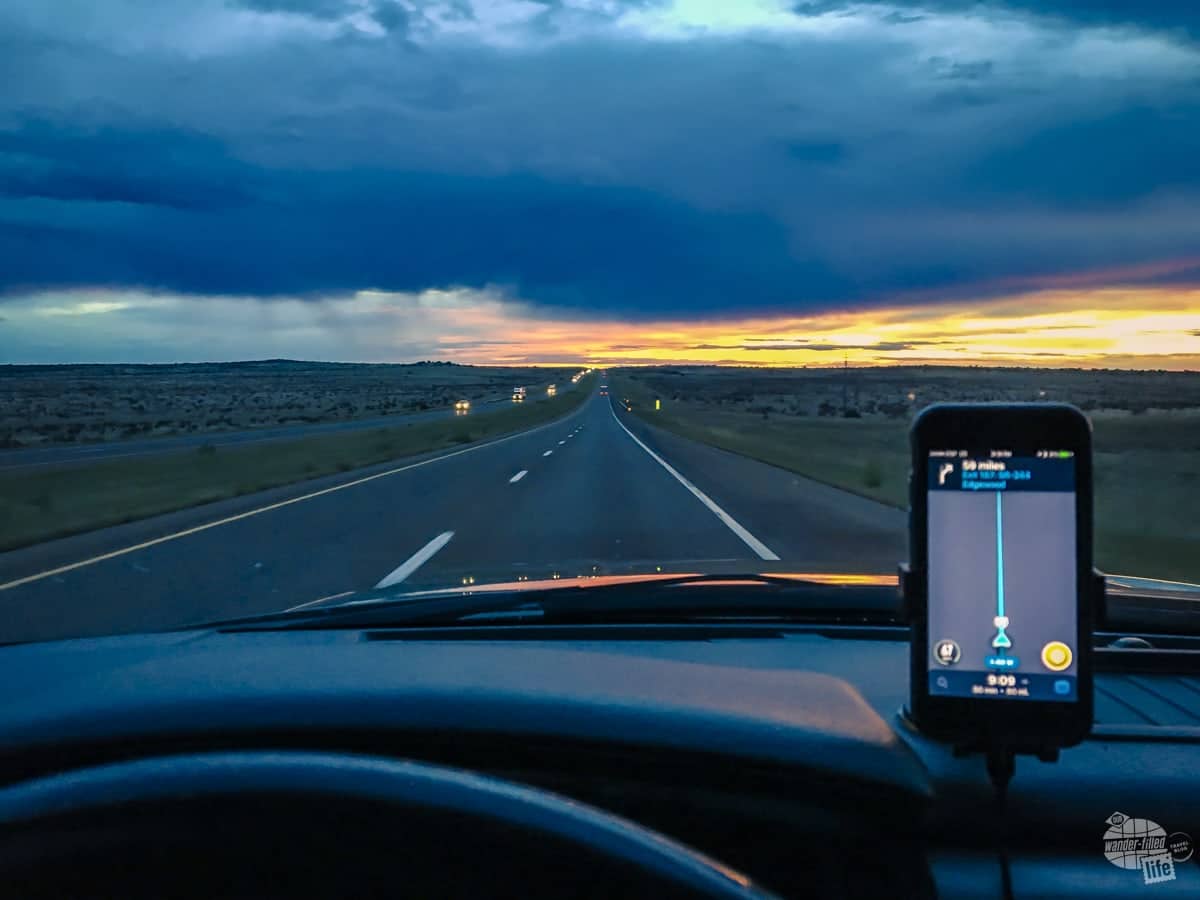
There are plenty of women who are like me and will drive the RV. For those of you who haven’t done it yet: start small. Find a large, empty parking lot or somewhere that doesn’t have a lot of traffic or tight turns and practice. Just get used to the feel of the vehicle and what it takes to start, stop and turn.
Driving a larger vehicle does take some getting used to. You do need to be comfortable with it before driving through a congested area. But, with practice, any driver can do it.
13) Fights happen, especially when backing up.
This is the big one. And this is something that really does take two people most of the time. Truly, anyone who can back up a trailer on their own is a superhero in my book!
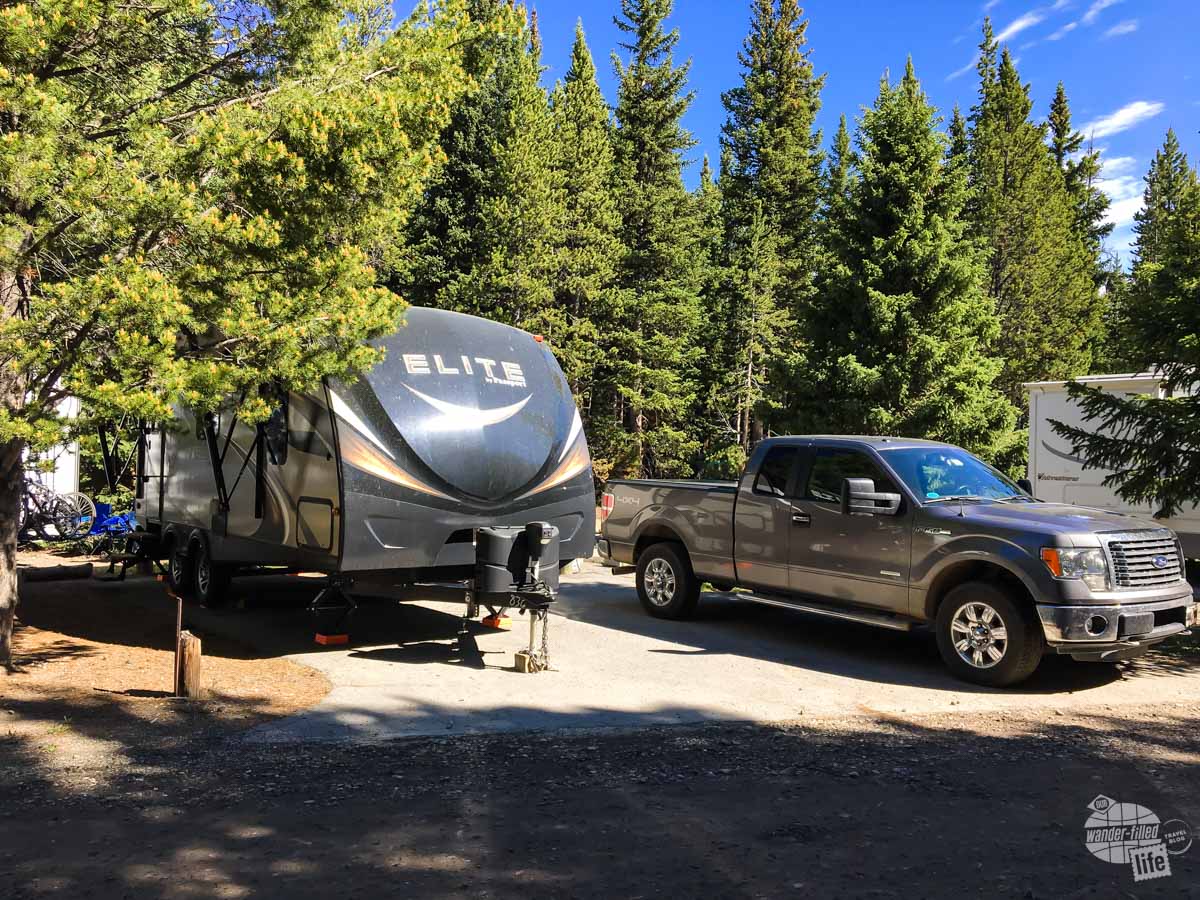
So, when you’re backing up, know that you don’t understand the other person’s point of view (or lack thereof). Still, no matter how many times you back up a trailer, it will be stressful. Often, you will say something you shouldn’t or won’t say something you should and it will lead to an argument. Just expect it.
Once you’re in place, cool off with an adult beverage. And if you do manage to avoid a fight, celebrate with an adult beverage! Yes, we like our adult beverages… in moderation, of course!
Going along with the “I can drive this thing too” thought, we have both been the driver backing into a campsite. But, in terms of “divide and conquer and become an expert” we decided to let Grant be the expert backer-upper. Or at least attempt to become one.
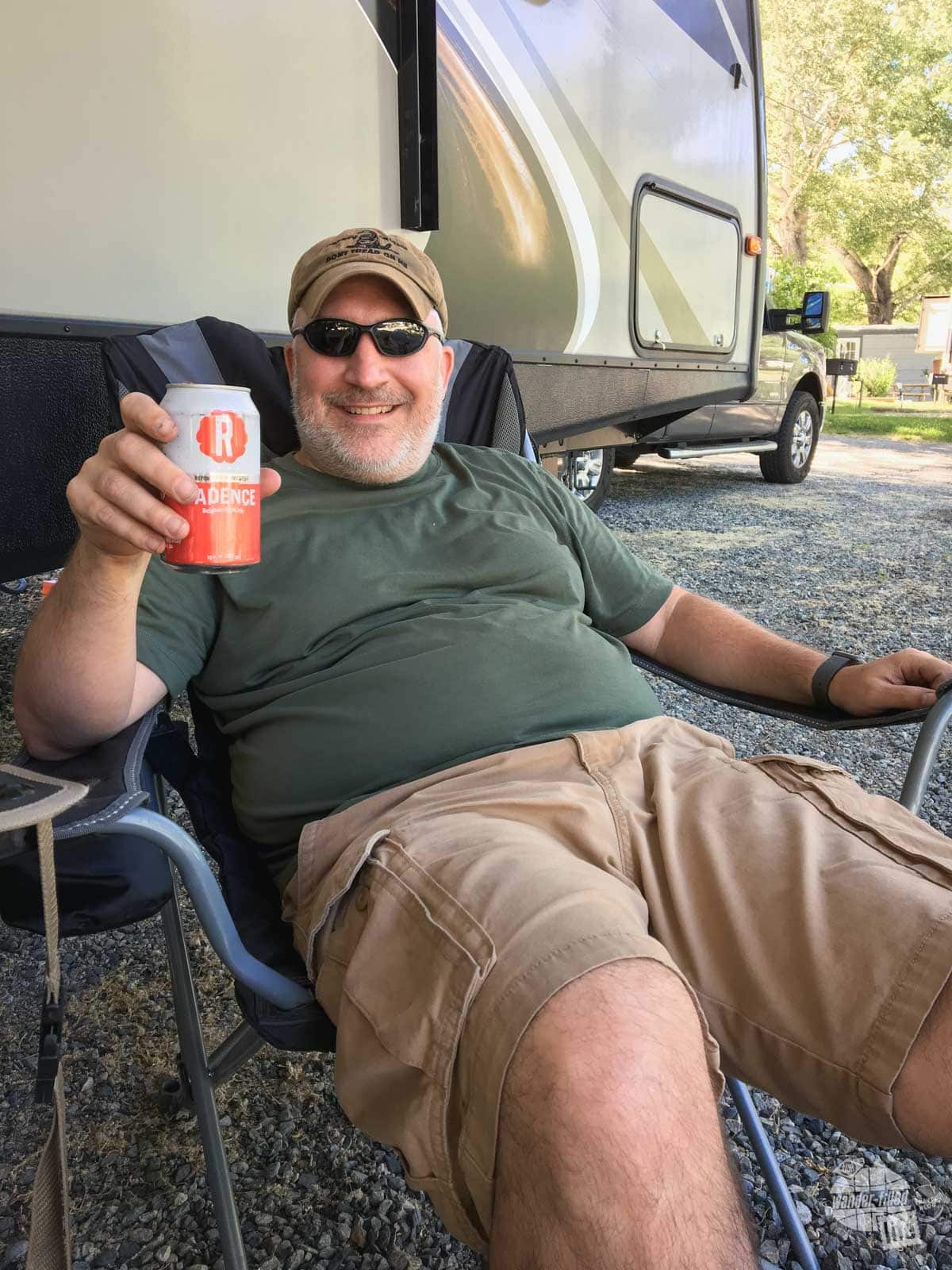
Truly, though, it is something that just takes practice. So, having one person “practice” consistently is better for us. And we learned that I am a bit better at getting the trailer leveled, meaning I have to be the one not driving.
Hopefully, you’ll find a system that works for you. Of course, most motor homes have a backup camera. And, even if you are towing a vehicle, you will unhook it to get set up into your campsite. Yes, we sometimes wish we had that.
14) Know that you are joining a great community.
If all this sounds stressful and overwhelming, that’s because sometimes it is. I don’t want to lie to you… managing a house on the road and all that entails can be difficult. But it is definitely worth it.
Taking your house and your stuff with you is comforting. Being surrounded by fresh air and nature is exhilarating. Seeing new places is life-changing.
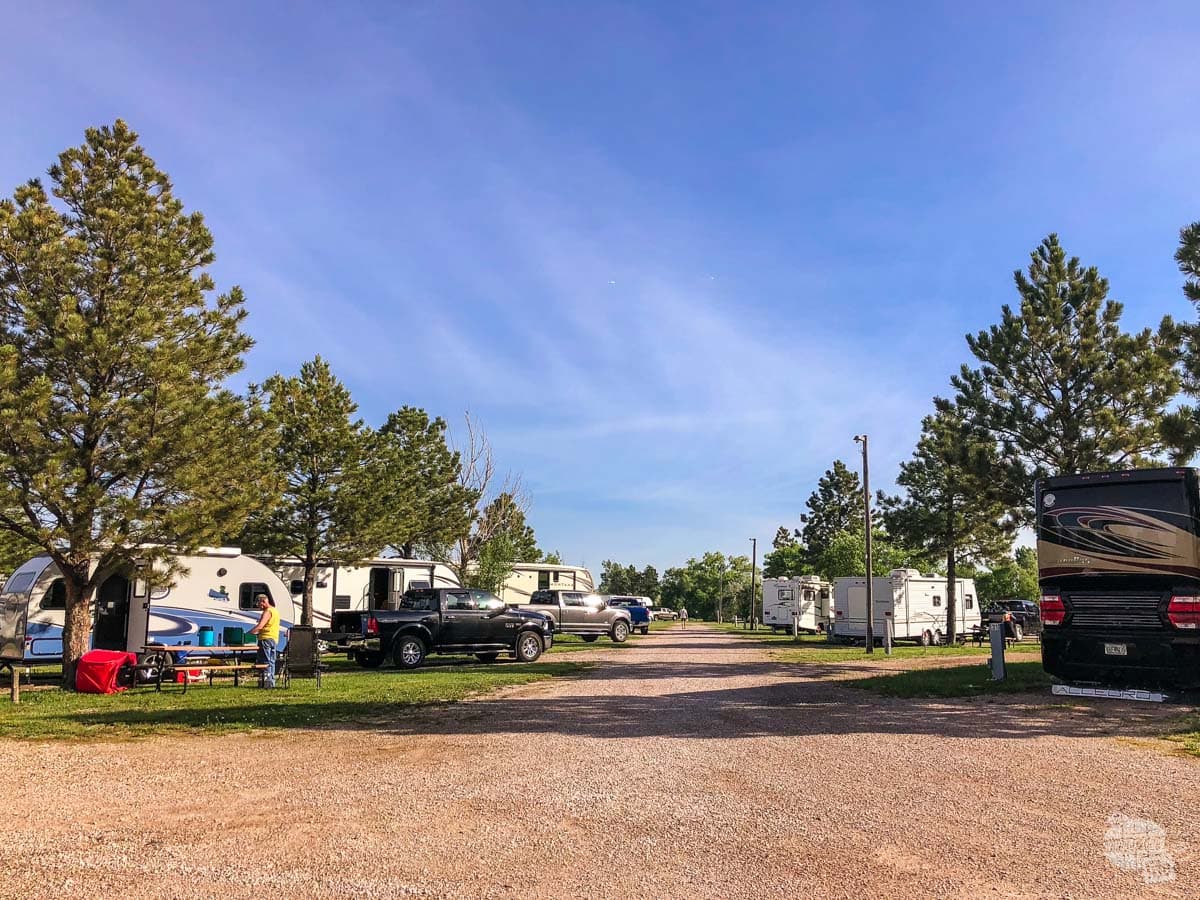
We have met some great people on the road. At campgrounds, you can just about always count on a neighbor to pass along a good tip for a nearby attraction or restaurant. If you’re in a bind, you can often find someone willing to lend a helping hand or offer advice.
Truly, RVing is a lifestyle that comes with its ups and downs, just like everything else in life. But, it is a wonderful lifestyle that you will, no doubt, fall in love with.
Final Tips for New RV Owners
Yes, there is a lot to learn with your first RV. But it won’t take long for you to figure it out. Seriously, after just a couple of trips, you’ll be advising others.
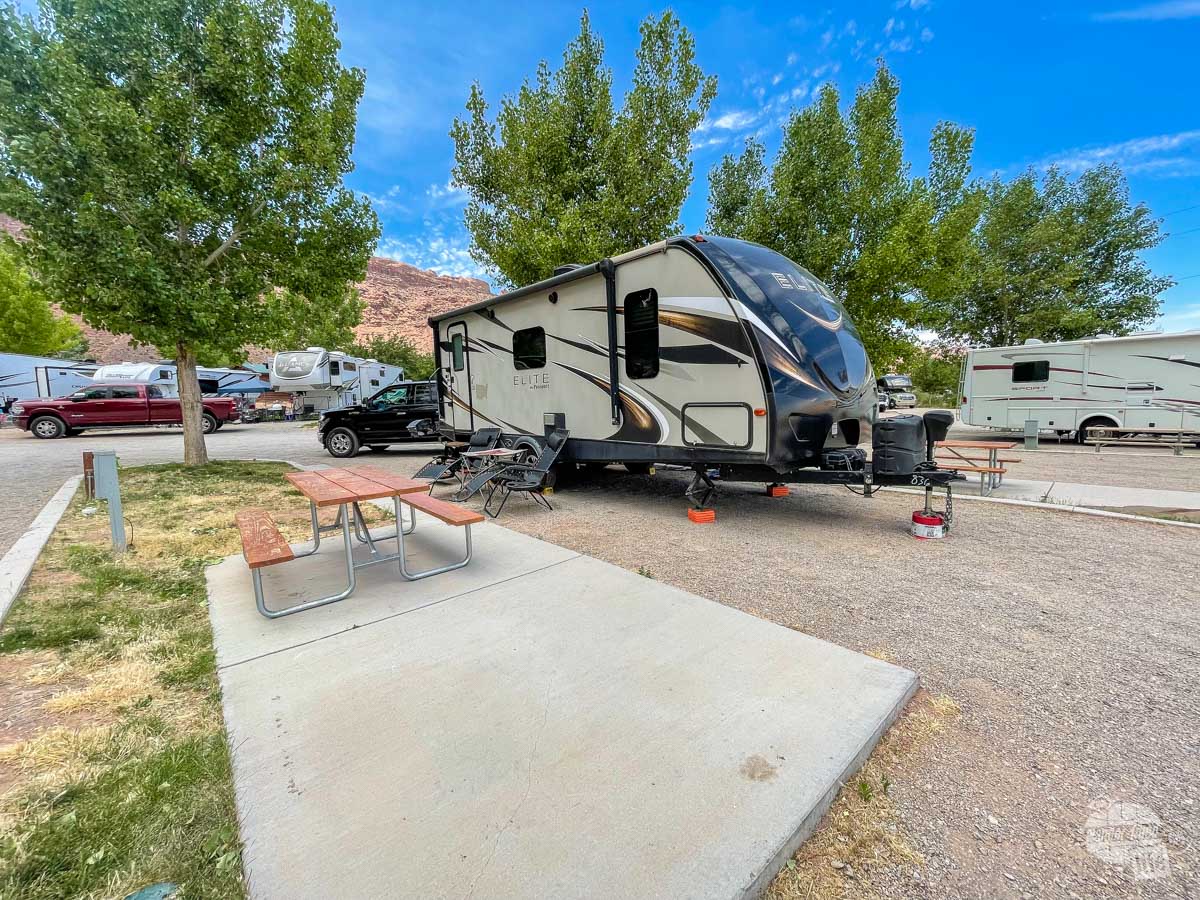
We suggest that for your first few trips in the RV, you stay close to home. And definitely stay close to a Walmart or RV store such as Campers Inn or Camping World.
If you have issues on the road, don’t be afraid to ask for help. The RV community is a wonderful group of people. Many will help you out or at least point you to the best place to get what you need.
Take your time, enjoy both the journey and the destination, breathe some fresh air and enjoy life on the road.
We invite you to join our Facebook group, USA RV Adventures. This group is for experienced, newbie and wannabe RVers to discuss RV destinations, itineraries and camping/travel tips.
Travel Resources
What do you use to find a flight?
We use Skyscanner to find deals on flights. Skyscanner has a great interface and compares tons of airlines for the best pricing and routing. That said, it does not always have every airline and some airlines will have better deals on their website. Still, Skyscanner is a great place to start.
Click here to search for a flight.
What do you use to find a hotel?
We typically stay at Hilton properties, so we use the Hilton website. You can find good Hilton Honors discounts or AAA discounts for a hotel there. We make great use of our free night certificates from our Hilton Honors American Express.
Click here to book a Hilton property.
If there are no Hilton properties available, we use TripAdvisor to read reviews and book the hotel. We find we can get the best price that way.
Click here to search for a hotel.
We recently partnered with Stay22 to add interactive maps to each of our destination posts. This will allow you to see a plethora of hotels and vacation rentals all in one responsive map of the area.
What if I need more space than I can get at a hotel?
We use Vrbo for the times when we have rented a cabin for a weekend getaway, like this cabin in Townsend, TN, or needed to rent a house for a large family vacation. We had a great experience with them in terms of refunding deposits when COVID hit and will continue to use them.
Click here to search for a vacation rental.
Who do you use for rental cars?
As a general rule, we book with Hertz for rental cars. We have had nothing but good experiences with them. Plus, we really like unlimited mileage and not worrying about crossing state lines. We have even rented from Hertz overseas in both Slovenia and Croatia.
Click here to book a rental car.
How about booking a cruise?
We have found some amazing prices for booking a cruise through Cruise Direct. We have saved a lot of money on our cruises compared to what we found elsewhere, making a last-minute Bahamas cruise even cheaper.
Click here to book a cruise.
What if I want to rent an RV?
We highly recommend Outdoorsy for RV rentals. We rented a camper van for a week to visit Rocky Mountain National Park for the elk rut and Custer State Park for the Buffalo Round-Up and had a blast. The program was easy to use and we really enjoyed the freedom of having a camper van for that trip.
Click here to rent an RV.
What do you use for booking tours?
We don’t often book tours. Typically, we like to do stuff on our own. That said, there are some experiences you can’t have any other way. So, when we do want to book a tour, we always check Viator first.
Click here to book a tour.
Do you use anything to get discounts on the road?
We make extensive use of both Good Sam and AAA on the road. Good Sam is normally regarded as a discount card for RVers at campgrounds and Camping World but anyone can use the 5 cents off a gallon at the pump at both Pilot and Flying J.
Click here to get a Good Sam membership.
We have had AAA as long as we have been married and it has more than paid for itself in discounts at hotels, aside from the peace of mind of having roadside assistance. Add in paper maps and the ability to get an international driver’s license and it is more than worth it for any traveler out there.
Click here to get a AAA membership.
